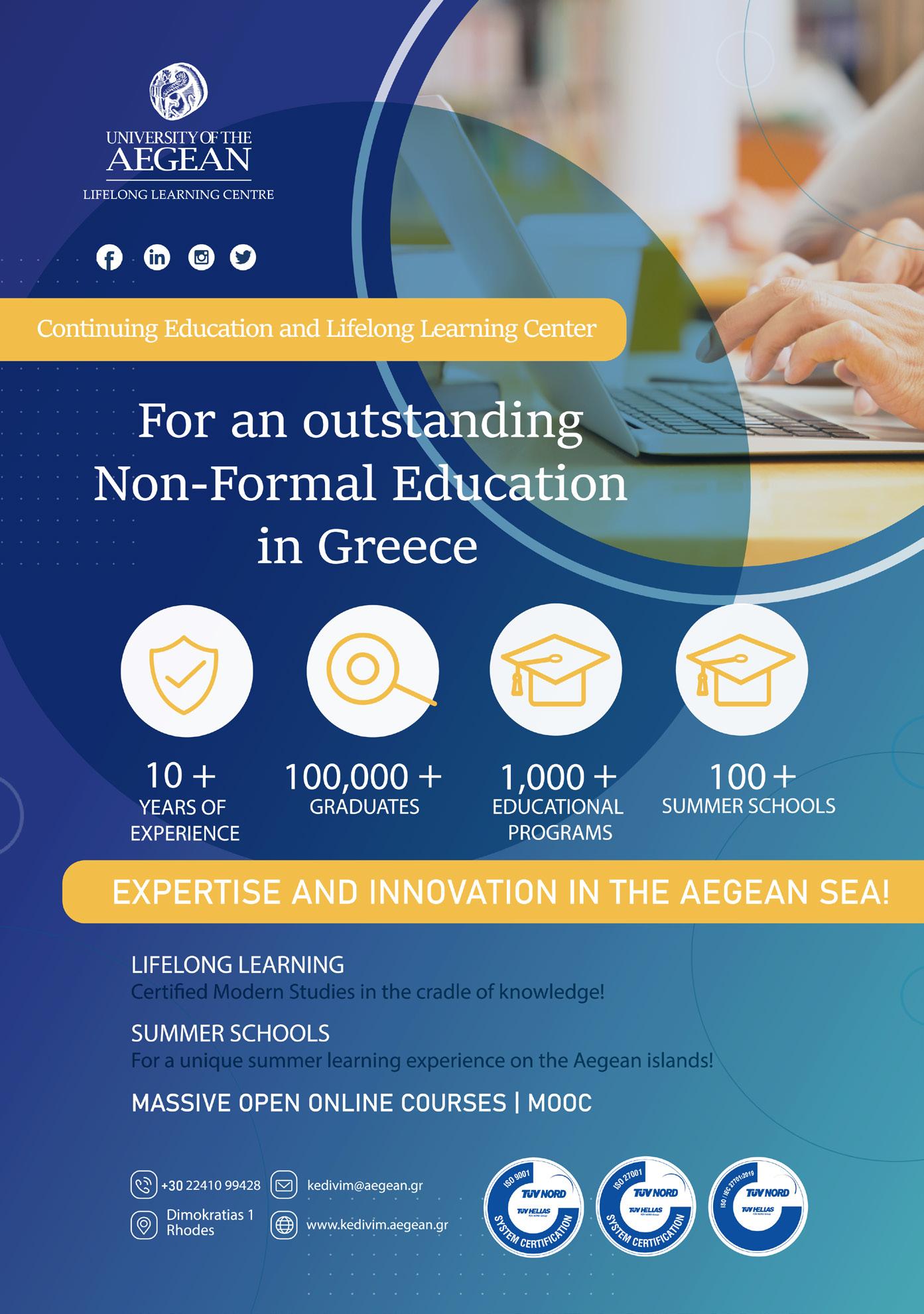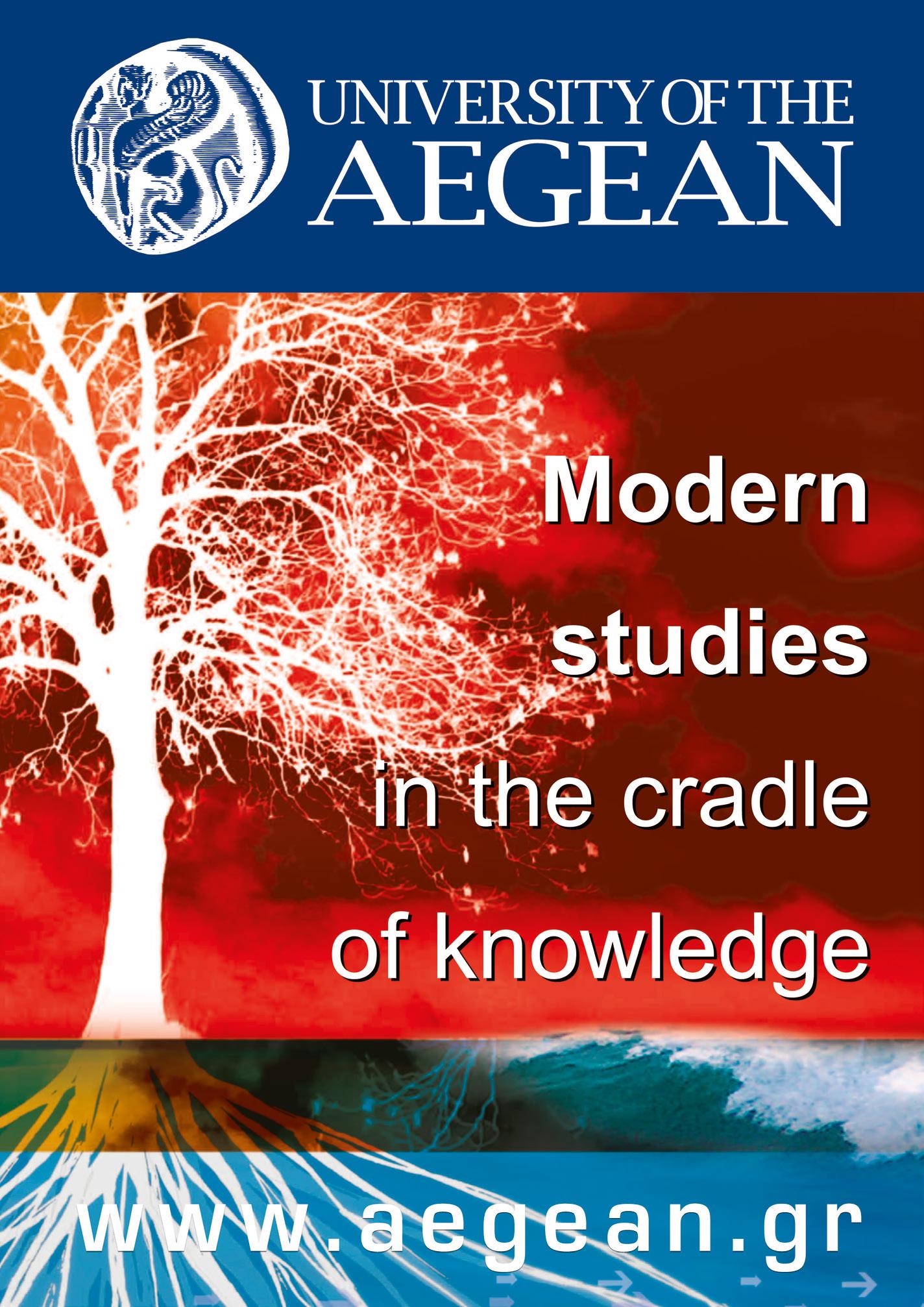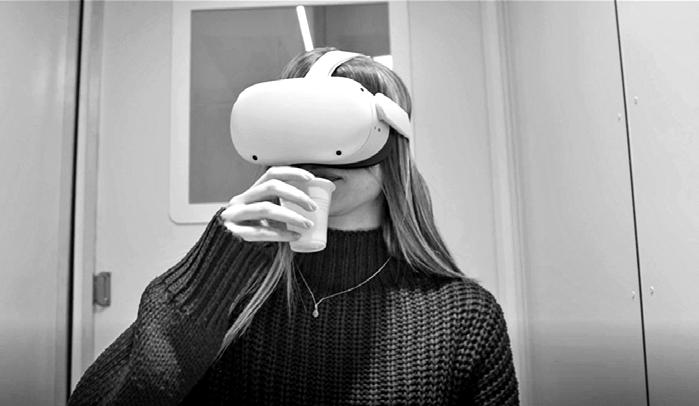
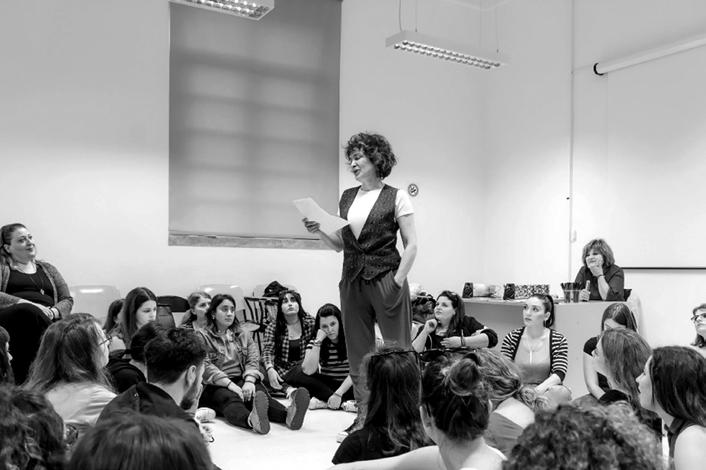
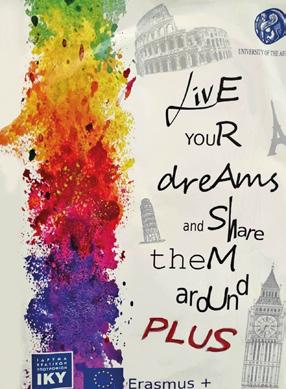
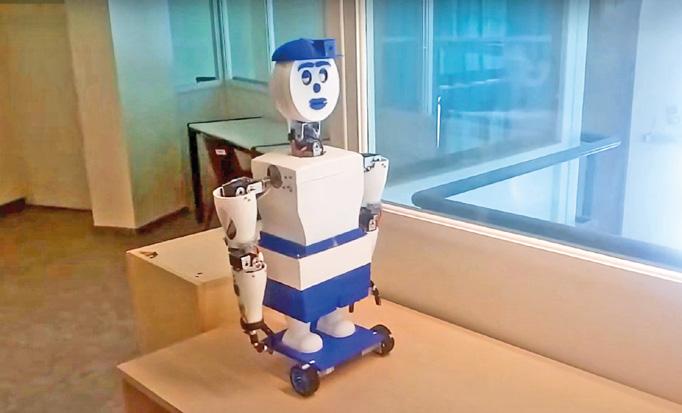

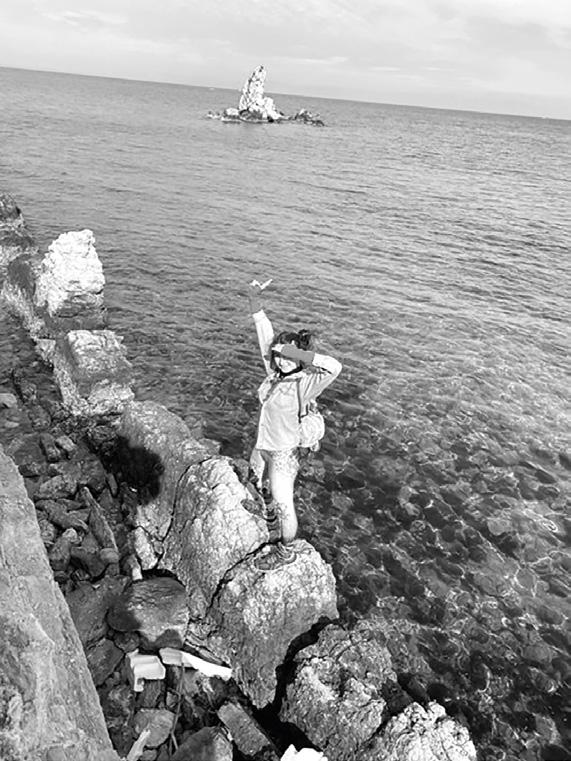
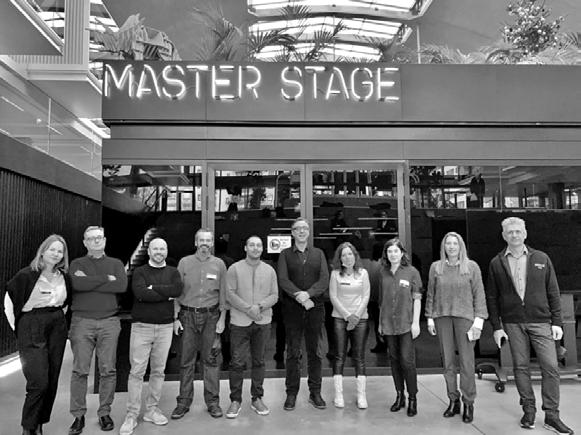
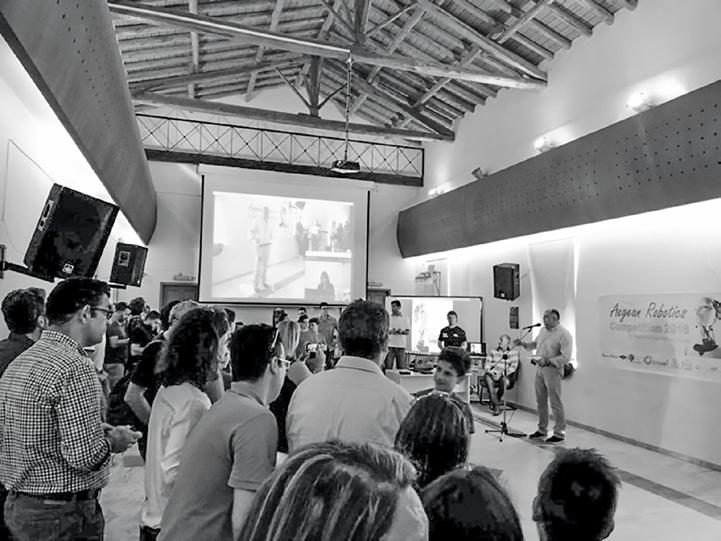
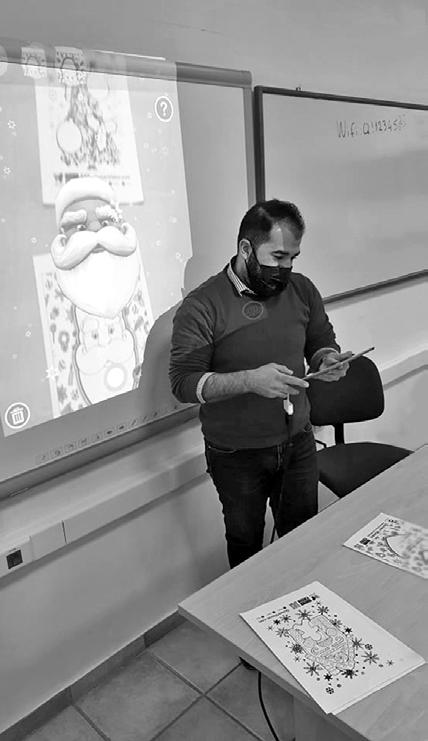

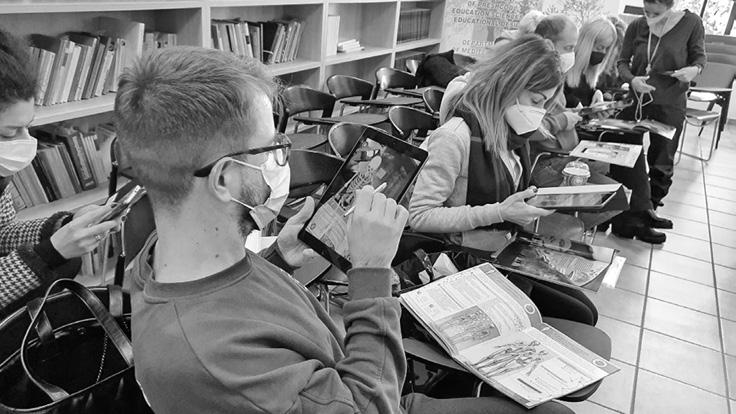
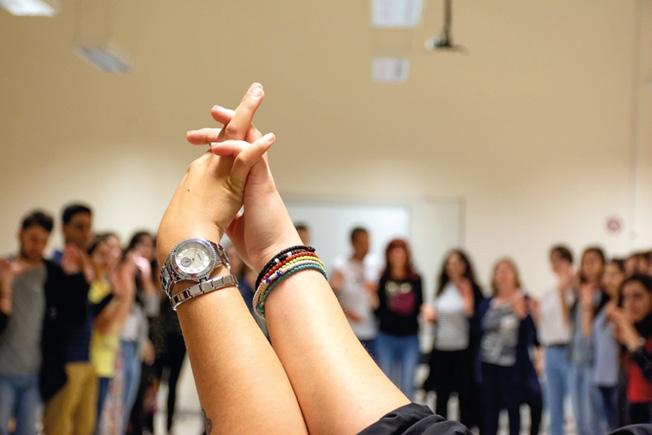
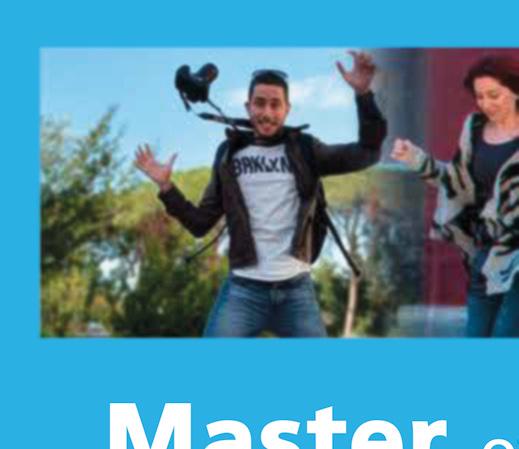
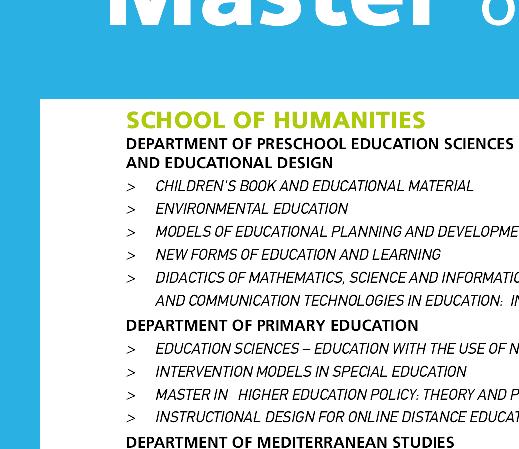

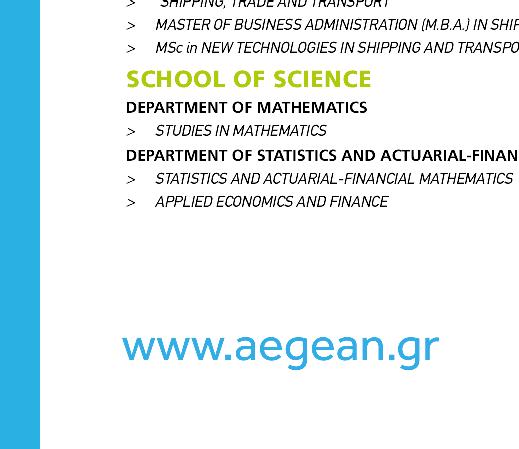
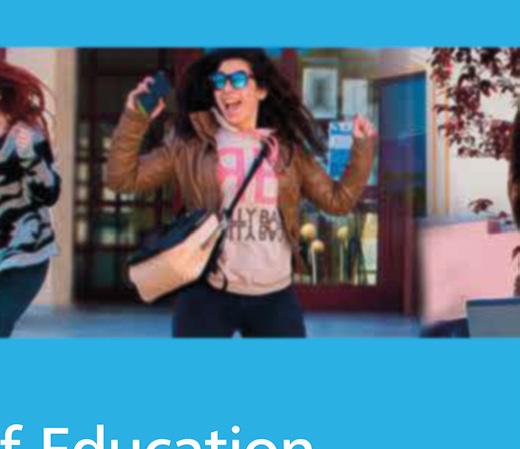

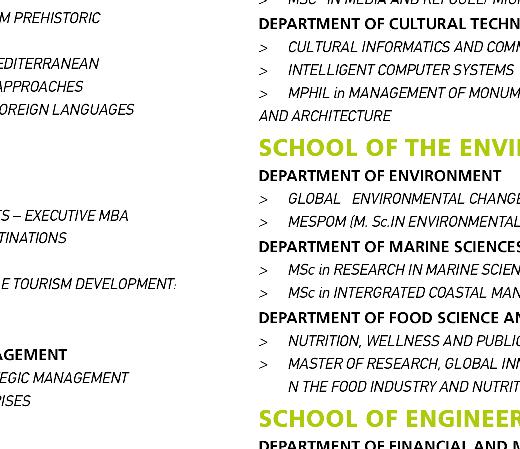
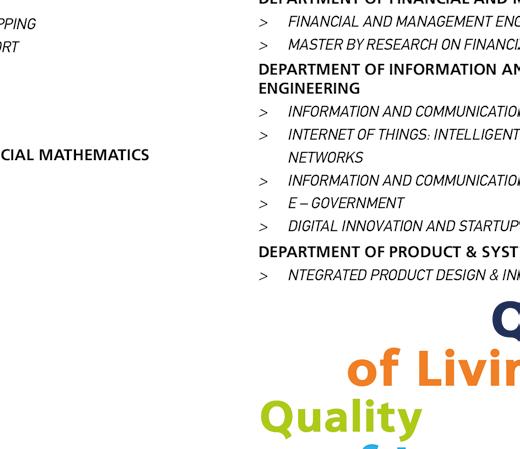

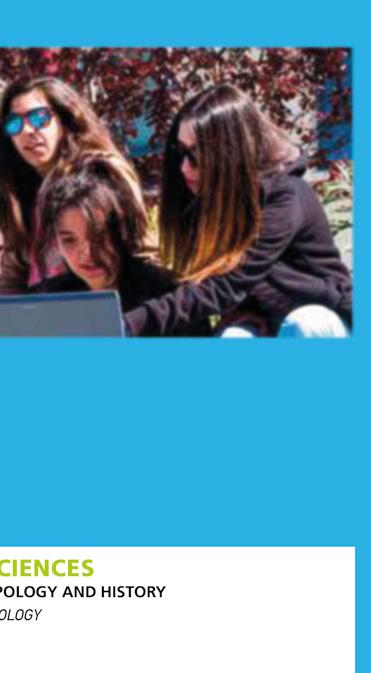
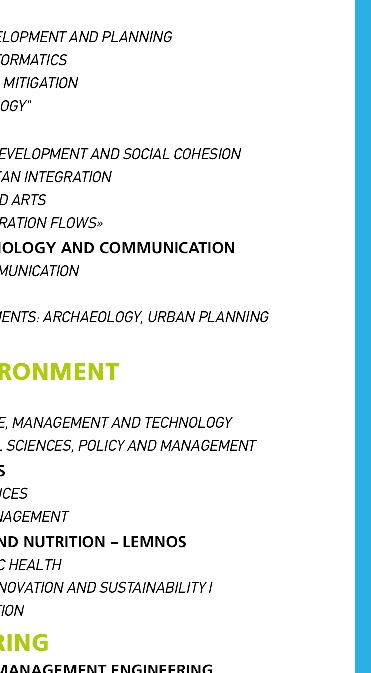
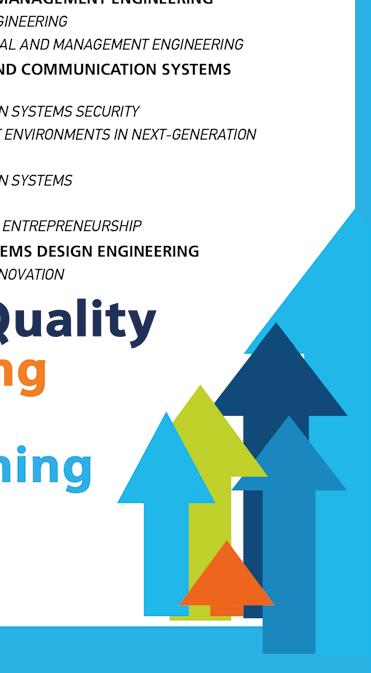
ΑΙΓAIO.EDU
THE UNIVERSITY OF THE AEGEAN MAGAZINE
Editorial
“Aegean.Edu” was designed to monitor and project the different aspects of life in our university community, capturing them exactly as an ongoing puzzle, with its multiple and diverse combinations in space and time; also, as an evolving overall picture of the University, which however, does not replace the parts that make it up, since the multiple activities have their own specific weight and meaning. The variety, the quality, the scope, the uniqueness of the actions transforms our University as a mutative living organism.
Through such a perspective, this 7th issue includes indicative actions of the Departments and their members for the period 2018-2022. We thus have the opportunity to ascertain, on the one hand, the extensive range of scientific fields in which these actions are developed, on the other hand, their multidisciplinarity and variety, while, at the same time, the applied dimension, on the one hand, and the systematic effort, on the other hand, are characteristically captured connection with the social environment and its multiple needs. In this context, we record a series of educational seminars/meetings and workshops (on topics such as environmental education, digital literacy, the administration and development of school units, or historiography) but also research programs/projects in areas such as augmented technology and virtual reality, Egyptology, sociology, innovation in the field of Production), the organization of international Conferences on specific topics (such as Metahumanism and Practical Philosophy) and national competitions (such as in the field of Robotics), student actions (such as undergraduate student conferences, participation in student competitions), the organization of summer schools, the development of innovative research and educational laboratories as well as innovative educational material, and, at the same time, actions to support the student population (such as the scientific framing of Counseling Stations). Finally, the issue hosts reports on the development of the Erasmus+ program at the University of Aegean as well as narratives of experiences from professors and students who carried out mobility at our University.
In this very University, we have learned to work with other guidelines and other measures: not metropolises, not centers, not vertical hard lines, but islands, regions, borders and spiral linesthis is how we discover the extreme in human experience. We live on the edge, which is why we develop the skills of acrobatics and the ability to live with the least and to establish realities on the minimum. For us, the edge is a bridge and a road: at every moment, our faith in space, in man, in nature needs to be confirmed and transformed into choices, decisions and actions; with remote centers and moving margins, with lively research and courageous openings to the world.
Through the infinite movements that connect the centers to the margins, from the sea to the land, and back again, the form of the Aegean is shaped, without stopping - and while it is formed, it is engraved and while it is engraved, it transcends the notch towards the horizons in which it looks forward to. With his people as "brave individuals, bright meteors and strongholds, where in their beautiful gestures and sacrifices lies the great, intense and endless life", as Miltos Kountouras would say, to create their collectivity with manual persistence.
Thus, as we travel from the Aegean to the world, the Aegean tempo becomes bearing life.
Professor Elena Theodoropoulou Vice-Rector of Academic Affairs and Student Welfare
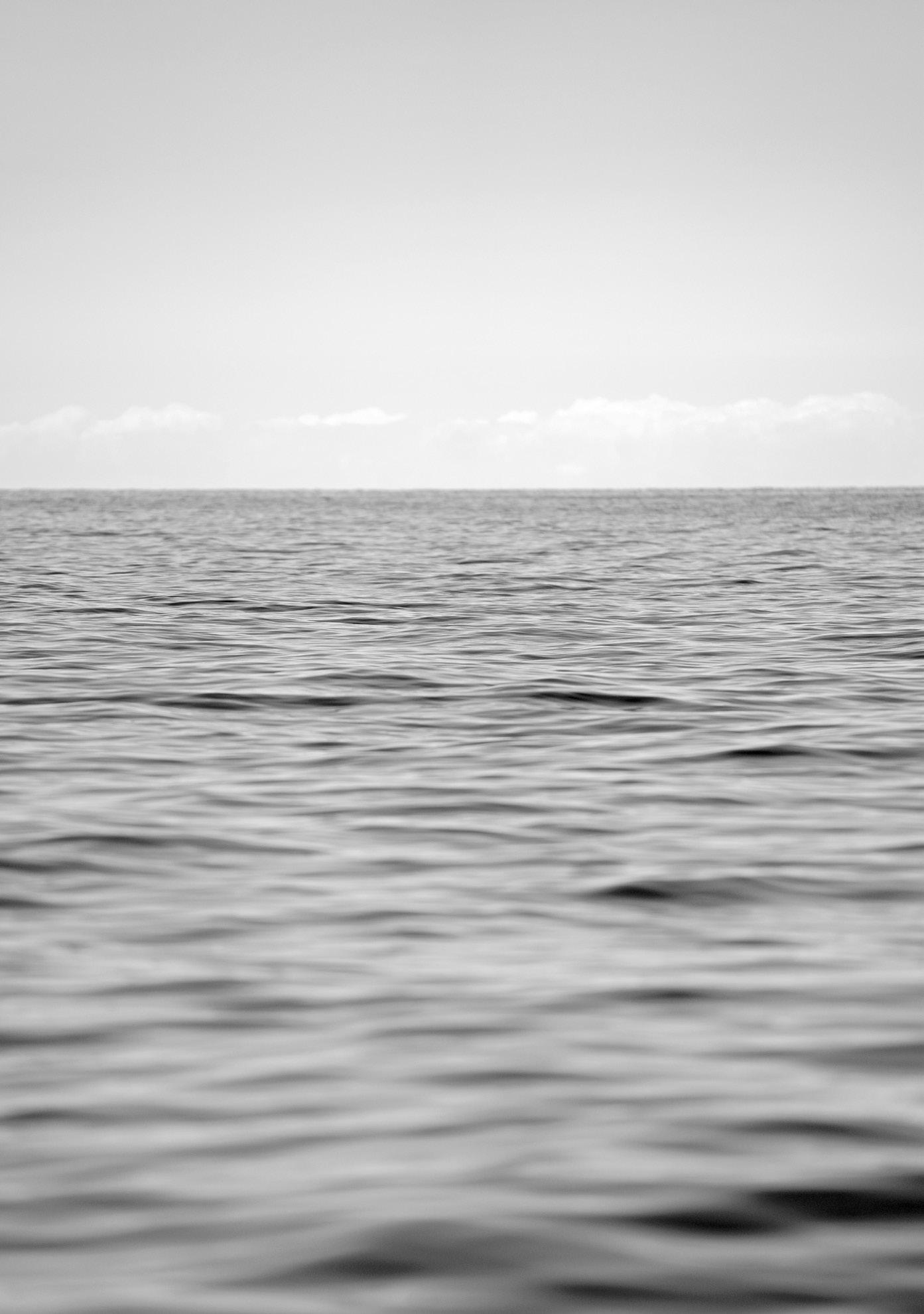
Address:
UNIVERSITY OF AEGEAN
University Campus, 811 00 Μytilene, Lesvos Greece
Τel.: (+30) 22510 36172-3
E-mail: relations@aegean.gr
Property of: University of the Aegean
Publisher: Chryssi Vitsilaki Rector
Managing editor: Elena Theodoropoulou
Vice Rector of Academic Affairs and Student Welfare
Editing:
• Office of Public & International Relations
• Secretariat of the Vice Rector of Academic Affairs and Student Welfare
• Editing in the English Language Tania Bogordou
Model design: Elisavet Kelidou
Issue graphic design & Printing-production
Cloudprint MON. IKE
Marathonos 7 144 22, Iraklio Attikis, Greece Τel.: (+30) 210 27 75 714 info@cloudprint.gr
5
8

Center of Psychological Support (CCPS)
Unit of Rhodes - University of the Aegean
of Preschool Education Sciences and Educational Design School of Humanities • University of the Aegean, Rhodes, Greece
School of Humanities
Counseling
University
Department
11 Department
Preschool Education
Educational Design and Department of Primary Education 12 Department of Primary Education 14 Department of Mediterannean Studies School of Business 15 Department of Business Administration School of Social Sciences 16 Department of Sociology 17 Department of Cultural Technology and Communication School of Engineering 19 Department of Information and Communication Systems Engineering School of Enviroment 24 Department of Food Science and Nutrition 25 The Aegean ERASMUS+ program 27 Erasmus experiences 30 Continuing Education and Lifelong Learning Center (CE-LLC) INDEX
of
Sciences and
School of Humanities
Counseling Center of Psychological Support (CCPS) University Unit of Rhodes - University of the Aegean
2018-2022: A course of support and information that continues…
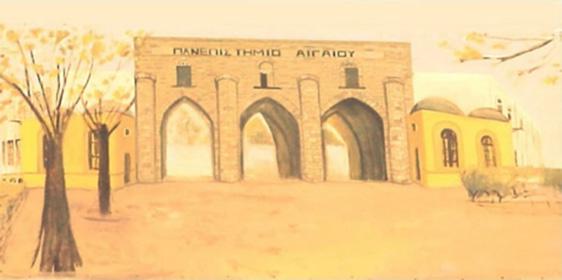
The Counseling Center of Psychological Support (CCPS) at the University Unit of Rhodes of the University of the Aegean was founded in 2010 on the initiative and decision of the Rector of the University of the Aegean (NUMBER 17/ 04.06.2008) and has been operating since March 2011 until today.
The CCPS functions as a network of psychological support for the students at the University throughout their studies. It is addressed primarily to the students and staff of the Faculty of Humanities of the University of the Aegean and secondarily to the public of Rhodes. Particularly:
• It is addressed to those who want to give solutions to some of their personal problems and seek help or wish to share their worries on important issues that concern them.
• Provides the opportunity to participate in personal development groups or individual meetings that take place in an environment of absolute confidentiality and aims to promote communication and a dynamic of support.
Interdisciplinary team 2018-2022
The interdisciplinary team of SSSY for the years 2018-2022 consists of:
• Theodoropoulou Elena, Professor in the Department of Sciences of Preschool Education & Educational DesignVice Rector of Academic Affairs & Student Welfare of the University of the Aegean
• Tsibidaki Assimina, Assistant Professor in the Department of Primary Education- Scientific coordinator of the CCPS
• Nikolaou Eleni, Assistant Professor in the Department of Sciences of Preschool Education & Educational DesignVice scientific coordinator of the CCPS
• Tsamparli-Kitsara Anastasia, Emeritus Professor in the Department of Primary Education - Ex scientific coordinator of the CCPS
• Spiggou Gavriela, Clinical psychologist, MSc (Voluntary work: 01/04/2020 to 30/06/2020 and project contracts: 01/04/2021 to 30/6/2021 & 07/12/2021 to 30/06/2022)
Actions implemented during the period 2018-2020: Support groups, one-day conference, and experiential workshops
12 December 2018 to 12 February 2019
Student Support Group: “Dealing with Traumatic Events"
Description: The group was addressed undergraduate and postgraduate students of all departments of the School of Humanities of the University of the Aegean. A support and counseling team, in which a safe space was created for the expression of feelings, cooperation, trust and acceptance. Planning and implementation: Mamalaki Evangelia, Psychologist, MSc, Unpaid collaborator of CCPS
Development and coordination: Tsibidaki Assimina
19 February 2019
One-day Conference: “Breaking the Silence: Psychosocial & Legal Extensions of Violence and Discrimination”
Description: The CCPS of the University Unit of Rhodes in collaboration with the Human Rights Committee of the Rhodes Bar Association and the Directorate of Social Policy & Health of the Municipality of Rhodes co-organized this Oneday Conference with the aim of combating violence and discrimination.
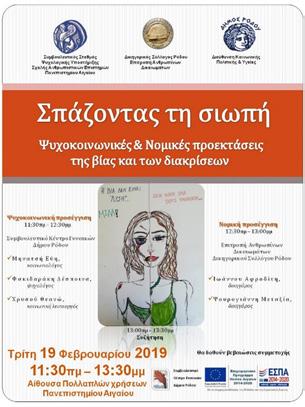
Development and coordination: Tsibidaki Assimina
23 February 2019 to 23 June 2019
Student Counseling and Support Group
Description: A support and counseling group holding with weekly meetings.
Planning and implementation: Mamalaki Evangelia, Psychologist, MSc, Unpaid collaborator of CCPS
Development and coordination: Τσιμπιδάκη Ασημίνα
13 May 2019
Experiential Workshop “Facing Extreme Situations Rediscovering the Community” Drama in Education & Creative Writing
AEGEAN.EDU | ISSUE 07 5
School of Humanities
Counseling Center of Psychological Support (CCPS) University Unit of Rhodes - University of the Aegean
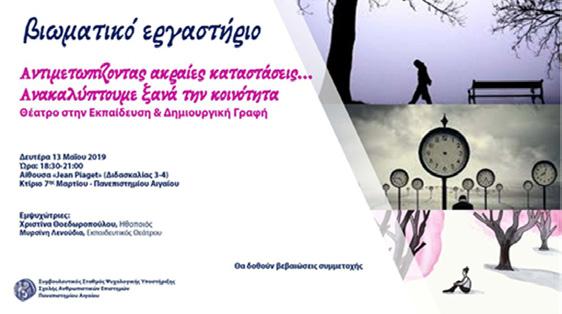
Description: The workshop aimed to deal with extreme situations through experiences and knowledge of drama, creative writing, experiential learning and synergy.
Tutors in charge of the workshop - Animators: Lenoudia Myrsini, Theater Teacher and Theodoropoulou Christina, Actress
Development and coordination: Tsibidaki Assimina
29-30 March 2019
Two-day Seminar: “Confrontations with Fear: Methods and techniques”
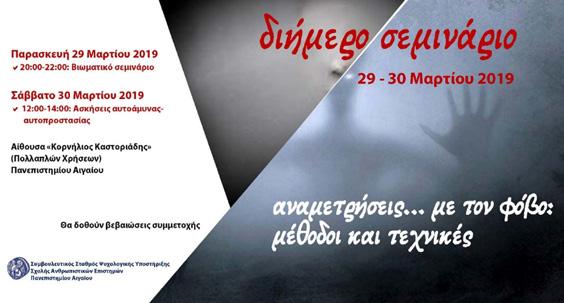
Description: The seminar focused on meeting and getting acquainted with fear, a basic human emotion caused by the realization of a real or imaginary danger or threat. At the same time, it sought psychological support, preparation, and empowerment as well as practical training in strategies and exercises of self-defense against situations of fear.
Tutors in charge of the workshop - Animators: Loutsiou Ira, Psychologist - Family therapist and Roubinis George, Instructor of Self-defense - Self-protection
Development and coordination: Tsibidaki Assimina
Actions implemented during the period 2020-2022: Focus on support and counseling of the university students
Actions of psychosocial support of university students
It is worth mentioning that in the context of student care and student support services, the student counseling, a multifaceted institution, operates in the Higher Education Institutions of the country and it is offered in special centers, the student counseling centers, and it is free.
CCPS in Rhodes during the years 2020 to 2022 offered psychological support through:
• Individual meetings of fifty-six (56) persons in total.
• Teleconference meetings, a total of twelve (12) persons, due to the special conditions of the COVID-19 pandemic.
• Psychoeducational group of university students stress management consisting of 5 persons.
The requests received by the CCPS related to socialization difficulties, difficulties in interpersonal relationships, time management and study organization in the examination period, emotion management, support in crisis within the family (e.g., parental divorce), stress management, mourning management as well as mood and behavioral problems.
Other actions of good operating practices of CCPS
For the present period:
• Six (6) requests for coverage of students’ needs have been referred to the respective collaborating bodies (Counseling Center for Children and Adolescents, General Hospital of Rhodes, Suicide Intervention Line-klimaka, Psychosocial Support Line of the Α’ Psychiatric Clinic of National and Kapodistrian University of Athens, Aeginiteio Hospital).
• Five (5) individual sessions are held daily from Monday to Friday and one (1) group session twice a month.
• Four (4) forms have been developed and implemented:
A Psychosocial Background Form
A Diagnosis Form for Mental Disorders
An Individual Counseling Consent form after information
An Individual Case Form
The CCPS through the interdisciplinary team, the rector’s office, the supereminent Vice Rector Prof. Elena Theodoropoulou, and the support of the entire School of Humanities follows a continuous course of support of the university students and envisions its continuation via psychologists and specialists. Besides, the vision of CCPS since its foundation is:
“We are by your side from the beginning to the end of your studies..."
AEGEAN.EDU | ISSUE 07 6
School of Humanities
Counseling Center of Psychological Support (CCPS)
University Unit of Rhodes - University of the Aegean
Photographic material of actions
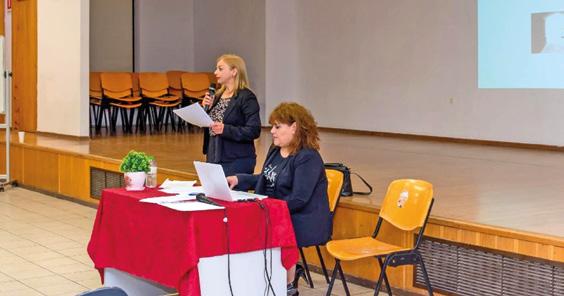
Two-day Seminar: “Confrontations with Fear: Methods and techniques”

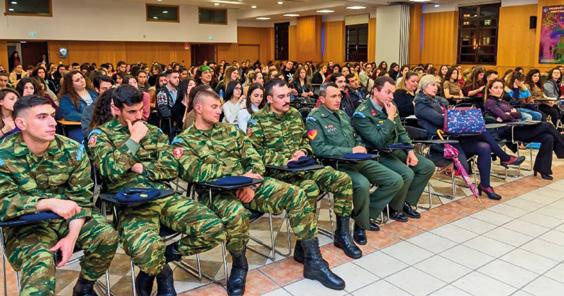
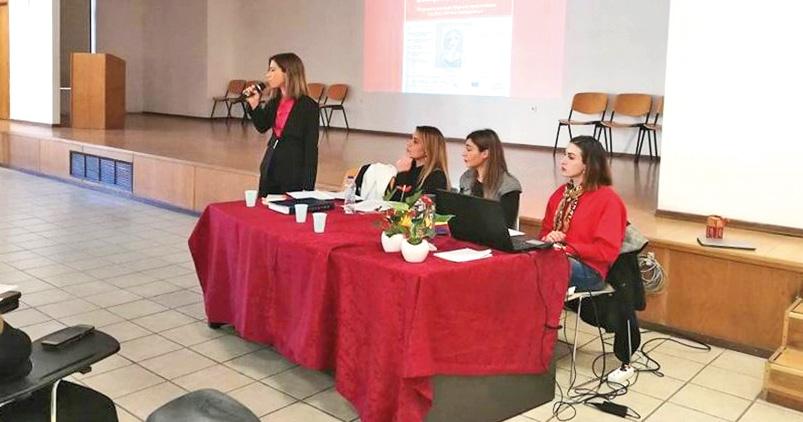
One-day Conference: “Breaking the Silence: Psychosocial & Legal Extensions of Violence and Discrimination”
Experiential Workshop “Facing Extreme Situations Rediscovering the Community” Drama in Education & Creative Writing
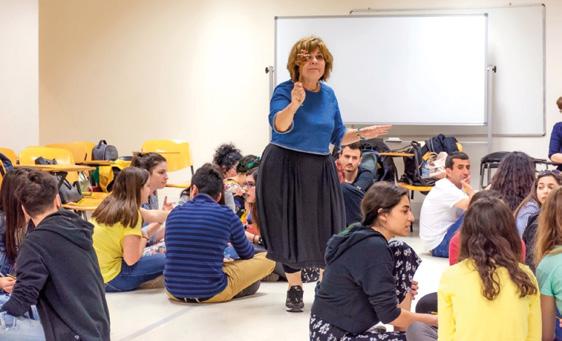
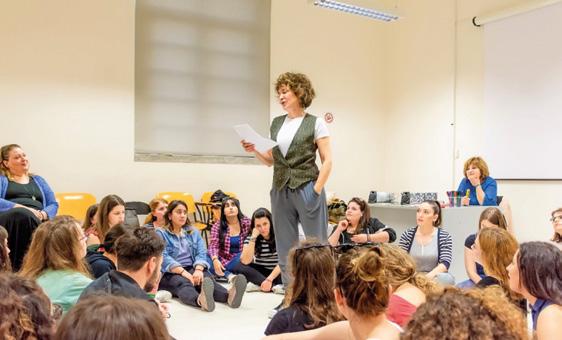
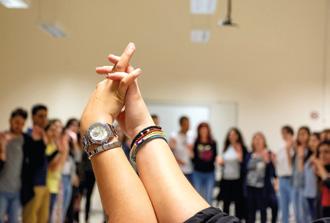

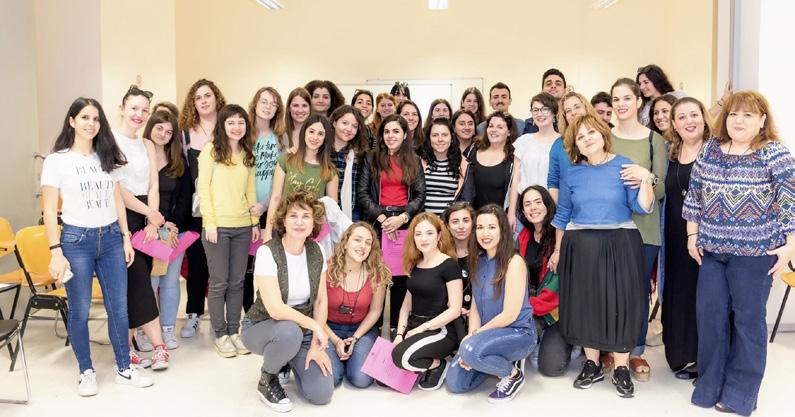
AEGEAN.EDU | ISSUE 07 7
School of Humanities
Department of Preschool Education Sciences and Educational Design School of Humanities • University of the Aegean, Rhodes, Greece
2nd On-line International Biennale of Practical Philosophy
Philosophy in Praxis. The philosophical gesture: political, ethical, educational, artistic engagements
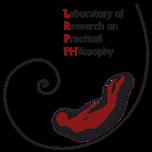
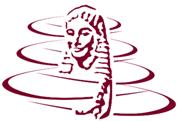
November 23-28, 2021 • Laboratory of Research on Practical Philosophy (L.R.P.Ph.)
The 2nd Online International Biennale on Practical Philosophy [«Philosophy in Praxis. The philosophical gesture: political, ethical, educational, artistic engagements»], which took place on November 23-28, 2021 under the organizαtion of the Laboratory of Research on Practical Philosophy (L.R.P.Ph.) of the University of the Aegean, was completed with a significant success. This is the first/only international Biennale in this field, which brought together about 100 speakers from 26 countries of the United States of America, Asia, Africa and Europe, while the 6-day activities were attended by more than 300 people. For this Biennale, the L.R.P.Ph. has collaborated with the different research structures: The Center for Interdisciplinary Research and Community Intervention of ISCET-Higher Institute of Business and Tourism Sciences (Centro de Investigaçao Interdisciplinar e Intervençao Comunitaria of ISCET- Instituto Superior de Ciências Empresariais e do Turismo), the Faculty of Philosophy of the University of Laval, Québec (Faculté de Philosophie de l’Université Laval, Québec, Canada), the Higher Institute of Educatiοn Sciences of the State of Mexico (Instituto Superior de Ciencias de la Educaciόn del Estado de México), the Post-Graduate Program in Education, State University of Rio de Janeiro (Programa de Pόs-Graduaçao em Educaçao [ProPEd], Universidade do Estado do Rio de Janeiro [UERJ]), the Laboratory of Studies & Researches on Contemporary Logics of Philosophy/EA 4008, University Paris 8-Saint Denis (Laboratoire d’ Études et de Recherches sur les Logiques Contemporaines de la Philosophie / EA 4008, Université de Paris 8 – Saint-Denis), the Department of Learning, Instruction and Teacher Education, University of Haifa, the School of Fine Arts of the University of Ioannina and the Laboratory of Image, Sound and Cultural Representation, of the Department of Cultural Technology and

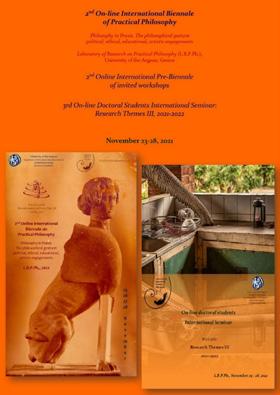
Communication of the University of the Aegean.
Keynote speakers of this 2nd Biennale were Professor Paul Standish, Head of the Centre for Philosophy of Education at UCL Institute of Education and life President in Philosophy of Education Society of Great Britain, Professor Maughn Gregory in Montclair State University and Director of the Institute for the Advancement of Philosophy for Children (IAPC) and Megan Laverty Associate Professor of Philosophy and Education in the Department of Arts and Humanities Teachers College of Columbia University in New York. The 2nd Biennale on Practical Philosophy also hosted on the one hand the 2nd International Pre-Biennale on Practical Philosophy through a series of invited workshops that investigated the possible forms of relation between practical philosophy and fields of thinking, expression, praxis being non philosophical per se, from digital culture to photography, from visual arts to architecture and music, from literature to theatre, and, on the other hand, the 3rd Doctoral Students International Seminar, where the ability/possibility of creating an intercultural version of the philosophical research that would exceed the globalized and established institutional modalities through the release of the particular gaze of new researchers that came from Brazil, China, Greece, France and Taiwan.
The ambition of a such organization is to explore the concept and function of practical philosophy today, with emphasis on its intercultural, anthropological and social dynamics in four axes: aesthetical, ethical, educational, political. The institutionalization of a such Biennale is an attempt of high difficulty and complexity, because there is no internationally academic community already established and organized systematically in the subject of practical philosophy, but because additionally, according to the perspective explored by the Laboratory of Research on Practical Philosophy, such a community is connected by nature and position with other communities non specifically philosophical, converting in that way the question of practical philosophy into a multifaceted stake with a special ideological and epistemological importance.
For more information:
https://practphil-biennale.aegean.gr/home_page_biennale_2021/
Prof. Elena Theodoropoulou
Directress of L.R.P.Ph.
Chair of the Biennale’s Scientific Committee
D.P.E.S.E.D., Univ/ty of the Aegean
AEGEAN.EDU | ISSUE 07 8
School of Humanities
Department of Preschool Education Sciences and Educational DesignSchool of Humanities
MASTER PROGRAM “Environmental Education”
Training seminar for the teaching staff of municipal nursery schools and the centers of creative employment of children of the island of Rhodes
A training seminar was organized for the teaching staff of municipal nursery schools, kindergartens and centers of creative employment (KDAP) of the island of Rhodes on "Planning, Implementation and Evaluation of preschool education environmental programs”, at Nestorideion Melathron, in Rhodes, on Thursday, 2 December, 2021, by the master program "Environmental Education", of the Department of Sciences of Preschool Education (T.E.P.A.E.S.) of the University of the Aegean and the Municipality of Rhodes ("Directorate of Preschool Education and Creative Employment of the Municipality of Rhodes").
A short welcome speech was given by Mr. Efstratios Karikis, Deputy Mayor of Education, Preschool Education and Immigration on behalf of the Municipality of Rhodes and Mr. Panagiotis Stamatis, Deputy Mayor of School Buildings’ Improvement, who attended the meeting, as well as by the President of TEPAES, Professor Nikos Andreadakis. In addition, a welcome speech was given by Mrs. Tsampika Diakou, nursery school teacher, Deputy Director of the Directorate of Preschool Education and Creative Employment of the Municipality of Rhodes.
The program consisted of two parts, the first was theoretical, while the second was one practical and experiential. In particular, in the first part there were four presentations. The first speaker was the associate professor Dr Stamatis Panagiotis and the title of his presentation was the "Means and ways of environmental awareness of preschool children", followed by Dr Eleni Nikolaou, Assistant Professor who presented "The role of the natural environment in children's development". In addition, Mrs. Theodora
Vidouri, Teacher, Graduate of the master program "Environmental Education" discussed about "Teachers' views on the design of programs within the context of Education for the Environment and Sustainability in the kindergartens of the Municipality of Rhodes". Finally, the director of the master program "Environmental Education", Vassilis Papavasileiou, Associate Professor, presented the "Design of environmental programs within the context of Education for Sustainable Development".
The second part, the practical-experiential one was entitled "Design of environmental programs within the context of Education for Sustainable Development", during which a collaborative environmental program was designed, in the context of Sustainability, by the members of the teaching staff who participated. Finally, a discussion followed, which also served as a final evaluation.
The seminar was attended by 105 members of the teaching staff of the Municipal Kindergartens and the centers of creative employment of children (KDAP) of the island of Rhodes, as it is included in the Memorandum of Cooperation of the Municipality of Rhodes with the University of the Aegean and it is linked to the goals of the master program "Environmental Education", for the development of sustainable actions, always, of course, in close cooperation with the educational community and local communities, seeking an holistic education and training of human resources that will be involved in the design and implementation of environmental programs of formal, non-formal and informal education.
AEGEAN.EDU | ISSUE 07 9
School of Humanities
Department of Preschool Education Sciences and Educational DesignSchool of Humanities
2nd Seminar Educational Engineering
“Structures, models, procedures, techniques and support tools of the systemic development of school units. The engineering’’
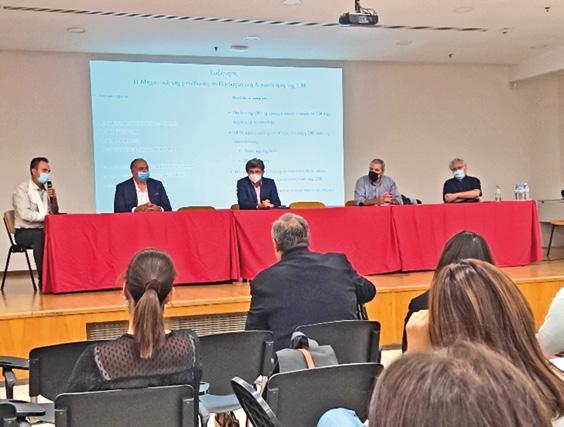
The Master’s Program “Models of Educational Planning and Development” organized with great success the 2nd Seminar Educational Engineering with topic: “Structures, models, procedures, techniques and support tools of the systemic development of school units. The engineering’’ of transition to the Pedagogic autonomy on the 2nd October 2021, in Rhodes, at the Aegean University.
The complex quest concerning the “autonomy of the school units” is to be added in a long list of political choices of an unorthodox management of a universal request of the different, complex and modern society function.
Questions such as: “how I can combine the autonomy with collective leadership procedures”, “how I can combine freedom with the restrictions of the democratic organization”, “how I can reinforce self-determination/ liberation simultaneously with empathy/ solidarity, are some of the questions which need to be examined in comparison with the real intentions of education and its real potentials of interfering with human development and society.
If these questions are to be asked without the systemic intelligence of comprehension, then there is the danger to be led in new endless possible versions of the bureaucratic autarchy, restrictions of initiation, and fear of cooperation.
The message about the autonomy of school units creates incompatible associations with the nature of social and pedagogical things themselves, misleading to a universal autonomy: self-existence. And therefore, in the fear of abandonment.
According to the systemic theory, the concept of autonomy is more interactive and quality wider than that of "self-existence", since it means functional and semantic distinction, but at the same time the emergence and recognition of difference as an intention of universal inclusion. Support in this conceptual framework means recognizing and enhancing the difference, the variety and the emerging entities: relationships, networks, structural links.
During the 2nd Seminar of Education Engineering there was the intention to set the boundaries for potentials, procedures, support tools and programs of school units as autonomies, from the point of view of the systemic theory and the theories of complexity.
The Seminar was addressed to executives of education of all levels and all types, to graduates of the Master's Program " Models of Educational Planning and Development", but also to all students and teachers of all levels and types of Education as well as to anyone interested in issues of educational planning as description, planning, implementation and evaluation of organized educational actions and interventions.
At the 2nd Seminar of Educational Engineering participated as main speakers Professor Kodakos A., Professor Kalavasis F., Professor Fesakis G., Stamatis P. Assistant Professor, Papavasileiou V. Assistant Professor, Kritikos G. Laboratory Teaching Staff. Also, the following guests honored the event with their presence: Kyriakoulis K., principal of a private school “Rodion Paideia”, Goutziamanis G., principal of a state school, Intzas M., Hotel Manager. There was a significant number of attendants from students of both years of the Master's Program " Models of Educational Planning and Development".
Dr. Anastassios Kodakos, Professor Director of Master's Program "Models of Educational Planning and Development" Department of Preschool Education Sciences and Educational Design
AEGEAN.EDU | ISSUE 07 10
School of Humanities
Department of Preschool Education Sciences and Educational Design and Department of Primary Education
3rd Conference of Undergraduate Students of the Pedagogical Departments of the Faculty of Humanities (S.A.E.)
May 21-22 2022
The Conference of Undergraduate Students of the Pedagogical Departments of the Faculty of Humanities (S.A.E.) of the University of the Aegean entitled EduTopia was inaugurated during the academic year 2016-7, on the initiative of the Dean of the S.A.E., during at that time, Professor Elena Theodoropoulou. In 2018, it evolved into a Panhellenic Conference, under the organization of S.A.E., while during the academic year 2018-2019 EduTopia fell under the organizational care of the two Pedagogical Departments of the Faculty of Humanities, which undertook its continuation. The EduTopia conferences are the first & the only ones so far, at least within the Pedagogical Departments of the country, with the participation of undergraduate students as the axis, and field for experimentation and free expression, as they connect different levels of university life on the basis of the student-centered principle, they highlight their particularities, while, at the same time, they aspire to become a driving force towards the production of new research in the Field of Education.
The philosophy of EduTopia has been developed on the basis of at least two goals: on the one hand, the goal to give the opportunity to students, future educators and researchers in the field of Education to form a discourse and take responsibility for it, and on the other hand, to create bridges of scientific synergy both between the two Pedagogical Departments of S.A.E., the Department of Preschool Education Sciences and Educational Design and the Department of Primary Education as well as with the other Pedagogical Departments of the country, highlighting the cooperative background and ethos in academic and research activity
Students, together with their professors, have the opportunity to publicize the results and products of their teaching and research work, to exchange opinions, to further develop their reasoning, to delve into theory and practice that shape the educational reality, to realize the multiple aspects and peculiarities of the complex and sensitive work they are studying. They thus learn to cooperate in the context of a traditional academic activity, such as a conference scientific meeting, to organize their thinking and speech respectively, to choose, to argue, to plan, to compile, to utilize bibliographic and research data, to undertake public the responsibility of their opinions. They realize that their learning experience has its substance in the context of a live scientific dialogue in progress that includes them as interlocutors by evaluating and utilizing their work as parts of it. On the other hand, this whole effort keeps its interest intact in the development of the Science of Education, as it is formed behind the scenes, in the laboratory spaces, in the classrooms, through daily experimental designs and designs of experimental reasoning and actions, while relief appears the interdisciplinary nature of the training of future teachers.
(see about the 2 Volumes of Practices, which have already been published in the context of EduTopia: Practices of the 1st Conference, Practices of the 2nd Conference)
For more information and material: https://edutopia.aegean.gr/
Professor Elena Theodoropoulou Assistant Professor
Asimina Tsibidaki

AEGEAN.EDU | ISSUE 07 11
School of Humanities
Department of Primary Education
Teacher training: The use of iPads in the educational process

The research group "Digital Media in Education and Media Literacy" (Media Pedagogy Research Group) of the Laboratory of Psychology, Pedagogical Research and Media in Education of the Department of Primary Education (Faculty of Humanities / University of the Aegean) held four training sessions on the topic:
"The use of iPads in the educational process".
The training was addressed to 10 teachers of the 1st and 2nd Experimental Schools of Rhodes.
The 1st training session took place on 11/12/21 - 11.0013.00 and included the following topics:
• Introduction to the iPad: its use in the classroom. It was presented in detail the iPad device, its functions and how it can be used in a school unit and thus in the classroom.
• Utilization of the pre-installed applications and functions: "iBooks", "Keynote" and "Screen Recording".
• Educational applications for teaching Algebra and Geometry "PencilBox", "Geoboard", "Fractions" etc.
The 2nd training session was held on 18/12/21 - 11.0013.00 and its topics were:
• Gamification of learning with the use of iPads. The applications "Quizizz", "Kahoot" and "Wordwall" were presented.
• Padlet: a collaborative, digital bulletin board for face-toface and distance learning.
• Surprise Christmas apps - "Quiver Mask", "Snow Globe", "Santa Was Here", "Catch Santa", etc.
The 3rd training session was held on 05/02/2022 - 11.0013.00 and the topics were:
• Image processing and digital material creation applications "PicsArt", "Thinklink", "Canva", "Artory", "Storybeat".
• Video editing applications: "iMovie", "ChatterPix Kids", "Puppet Edu", "Voki for education".
• Screen recording and capture on the iPad.
• Educational applications for teaching geography: "Google Earth", "World Geography", "My Countries Map", "Maps of our world", "TrueWorld", "StudyGe".
The 4th and last training session took place on 12/02/2022 - 11.00 - 13.00 and the topics were:
• Augmented Reality educational applications: "Quiver", "iSolarSystemAR", "iStormAR", "iBugsAR", "SolarSystem3D", "LittleExplorers", "DEVAR (Solar System, Human Body etc.)", "MeasureKit", "The Brain AR", "Sketch AR", "CleverBooks Geography", "CleverBooks Geometry", "3D Shapes Create", "AR Protractor".
• Other educational applications/methods: Google (Google Lens), True World (True Size of...), Map Chart, Cut Out Animation.
• Presentation of an indicative learning scenario using the iPad.
The above training will be completed by the participants writing learning scenarios using iPads and implementing them in the classroom
Teacher Trainer: Spyros Spyrou, PhD Candidate, University of the Aegean
Organization - Coordination: Panagiotis Kanychis, PhD Candidate, University of the Aegean
Scientific supervisor: Alivizos (Loizos) Sofos, Professor, University of the Aegean
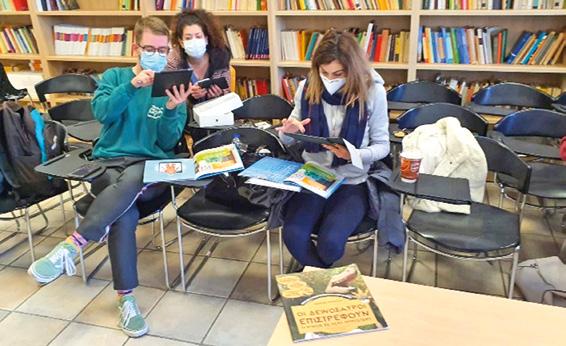
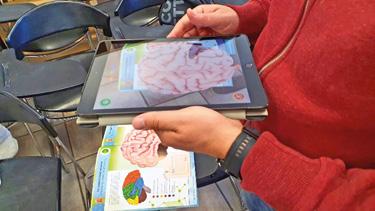
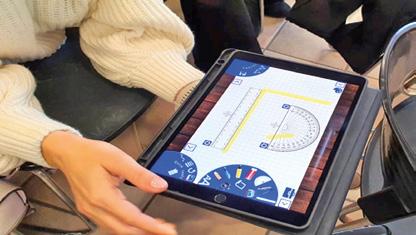
AEGEAN.EDU | ISSUE 07 12
School of Humanities
Department of Primary Education
The History and Social Sciences Laboratory of the Pedagogical Department of Elementary Education of the University of the Aegean, in collaboration with the KEVIDIM of the University of the Aegean, wanting to strengthen the strong two-way link of communication between the academic community and civil society, organizes during the current academic year 2021 -2022 educational activity for teachers, students, but also for anyone interested under the title: "On the wings of history: Magnetic circles of Monday". The History and Social Sciences Laboratory of the Pedagogical Department of Elementary Education of the University of the Aegean, in collaboration with the KEVIDIM of the University of the Aegean, wanting to strengthen the strong two-way link of communication between the academic community and civil society, organizes during the current academic year 2021 -2022 educational activity for teachers, students, but also for anyone interested under the title: "On the wings of history: Magnetic circles of Monday". The work of the educational seminar will last eight months. Each meeting lasts 3 hours and takes place remotely with the corresponding electronic support of the University of the Aegean. The Educational Action is being carried out with success and the large and constant participation of those who attend it from the beginning and throughout the current academic year.
The research group "Digital Media in Education and Media Literacy" of the Laboratory of Psychology, Pedagogical Research and Media in Education of the Pedagogical Department of Elementary Education participates in the VRinHE and REVEALING research projects on the integration and utilization of augmented (AR) and virtual reality technologies (VR) in Higher Education. These two technologies can constitute the new generation of technological means for the digital transformation of higher education institutions. In particular, the VRinHE project “Integrating Virtual and Augmented Reality in Higher Education Curricula” is a European-funded Erasmus+ project that aims to develop the capacities of academics, learning designers and teaching staff to integrate VR/AR technologies in course design and delivery. The project will lead to the development of a toolkit, a training program and a MOOC for the integration of VR/AR technologies in higher education. The project involves partners from Greece, Cyprus, Bulgaria, Latvia, Austria. Accordingly, the REVEALING project “Realization of Virtual Reality Learning Environments for Higher Education” is a European funded Erasmus+ project that aims to develop, evaluate and implement a virtual reality platform for Higher Education. Partners from Greece, Cyprus, Portugal, Germany, Poland participate in the program. Both projects have a duration of two years (2022-2024) and are expected to contribute significantly to the development of the expertise of the research staff of the group as well as the involved academic staff of the University of the Aegean.
AEGEAN.EDU | ISSUE 07 13
School of Humanities
Department of Mediterannean Studies
Aegyptiaca as indicators of religious and cultural interaction in the Southeastern Mediterranean: The multiple implications of Egyptian and Egyptianizing scarabs in the Aegean (8th-6th century BC)

The Mediterranean region is a complex mosaic of different population groups and cultural identities, linked through various communication networks. In the Early Iron Age, objects, motifs, and ideas of social and religious content from the Near East and Egypt are spread throughout the Aegean as a result of reactivation of commercial and cultural contacts, after the end of the Bronze Age. Since religion is an intrinsic element of cultural identity, comprehension of the interplay between religious artifacts, images and ideas is vital in order decipher cultural interconnection. The study of interaction between Egypt and Greece in religious ideology, magic and popular cult has been overshadowed by the undisputed influence of Near Eastern art and thought on the Greek world in the Archaic period, which has been thoroughly analyzed. This is evident mostly in the significant diffusion of Egyptian and Egyptianizing objects (i.e. scarabs, amulets, vessels, etc), known as Aegyptiaca. The richest category of Aegyptiaca includes scarabs, scaraboids and seals, which may have not only imported but also reproduced in local workshops. From the middle of the seventh and during the sixth century BC, Egyptianizing objects of mixed style – vessels, anthropomorphic and zoomorphic figurines and amulets- were manufactured in a faience workshop, most likely established on Rhodes with the contribution of Phoenician craftsmen. Previous scholarship, based only on typology, states that a special category of scarabs, known in the bibliography as “Lindos-Perachora” or “Rhodes-Perachora” may also have been manufactured on the same island – from the latter half of the eighth century BC to the first quarter of the seventh century BC. However, traces of processing (molds, discarded, waste, etc) of a workshop have not been found on the island, and the predominant theory about the production of
these scarabs in Rhodes is based in the strong assumption that there was a workshop there, as shown by the thorough typological study of Egyptianizing by V. Webb. Even though, the largest assemblage concerning number and variety of this type of scarabs has not been found in Rhodes- although Lindos assemblage is very significant- but in the votive deposit of Perachora. The existence of many series of almost identical pieces is a crucial element requiring further investigation since it could indicate the existence of a workshop there or nearby. The project reinvestigates the typology and archaeological context of scarabs from Perachora, Heraion of Argos, Ialysos and Lindos, in order to shed more light to these significant questions. Since scarabs are the largest category of Aegyptiaca in the Aegean, they can be used as a very representative sample for a thorough interpretation of the complete corpus, promoting future research in this field.
This research is co-financed by Greece and the European Union (European Social Fund- ESF) through the Operational Programme “Human Resources Development, Education and Lifelong Learning 2014-2020” in the context of the project “Aegyptiaca as indicators of religious and cultural interaction in the Southeastern Mediterranean: The multiple implications of Egyptian and Egyptianizing scarabs in the Aegean (8th-6th century BC)” (MIS 50049415).
Scientific Supervisor: Prof. P. Kousoulis
Researchers:
Dr. E. Apostola, Dr. Ch. Papadaki
Site: http://aegeanegyptology.gr Email: egyptology@aegean.gr

AEGEAN.EDU | ISSUE 07 14
European Union Operational Programme Human Resources Develpment, Education and Lifelong Learning Co-financed by Greece and the European Union European Social Fund
School of Business
Τμήμα Μεσογειακών Σπουδών
Department of Business Administration
3rd Place in the Hellenic Student Entrepreneurship Competition JA Startup 2021 for the University of the Aegean
On Friday, May 28, 2021, the final phase of the 7th Pan-Hellenic Student Entrepreneurship and Innovation Competition JA Start Up of Junior Achievement Greece took place online. From a pool of dozens of ideas submitted by almost all Greek Universities, 10 student teams qualified for the JA Start Up 2021 Final. The start of the competition was announced by the President of the "Greece 2021" committee, Gianna Angelopoulou - Daskalaki. The online event was attended by the President of Hellenic Federation of Enterprises. and many other personalities from the academic and business community, while the leading Brand Strategist Peter Economides gave advice to the students.
The University of the Aegean was represented by two Student groups, farmit.gr and Avatry, under the guidance of the Assistant Professor of the Department of Business Administration and Director of the Laboratory of Entrepreneurship Management and Innovative Education, Dr. Ioannis Kinias.
After the presentation of the teams and the evaluation of the business plans, the first 3 prizes were awarded. The farmit.gr team of the University of the Aegean won the 3rd prize and the €1,000 prize for its first business steps. Farmit. gr is an electronic platform that aims to connect producers of the primary sector with consumers. Producers enjoy greater exposure of their products to the general consumer public and gain access to customized data on their sales in each period. Consumers can find on the one hand a huge range of products of all kinds of the primary sector, on the other hand detailed information on the products they are interested in, such as the cultivation method and can choose either home delivery or collection from the farm.
The recognition and acceptance of farmit.gr is already impressive, since more than 200 producers from all over Greece have already contacted the group, asking to join the platform, once it is operational. The farmit.gr Student Team consists of: Dimitrios Katsakiori, Filippos Koufopoulos, Margarita, Fotiou Dimitrios, Trovias Elena Giannakopoulou.
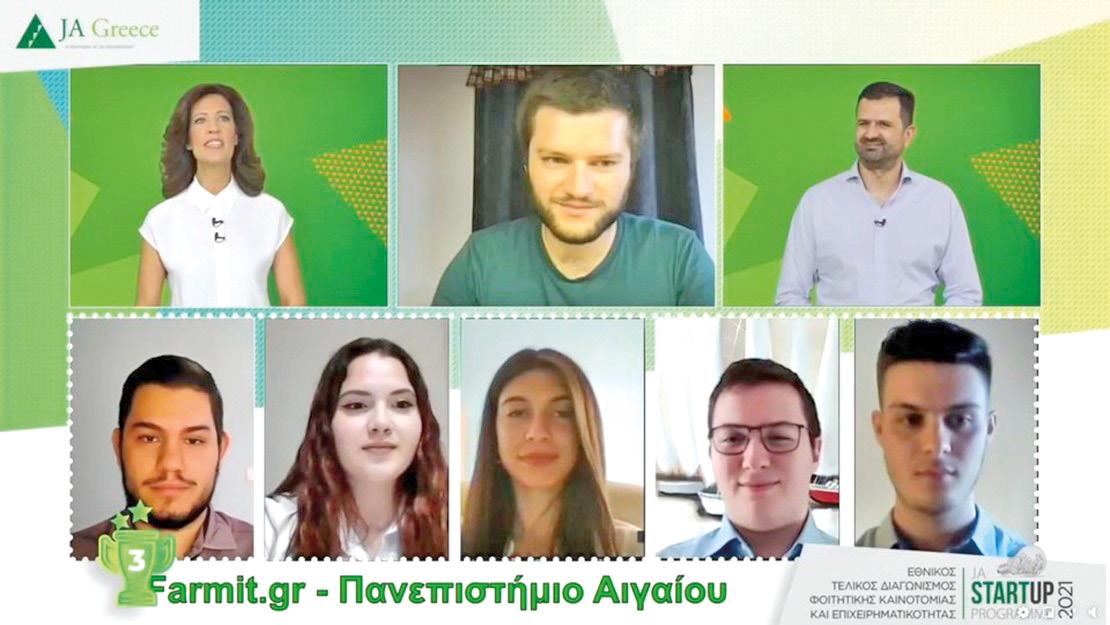
AEGEAN.EDU | ISSUE 07 15
School of Social Sciences
Department of Sociology
Presentation of the Research Project
"The perspective of a permanent refugees’ and immigrants’
settlement in Greece: revealing the demographic and sociο-economic consequences and their importance for the greek society’s acceptance

“Η προοπτική μίας μακροχρόνιας παραμονής των
Ανάδειξη




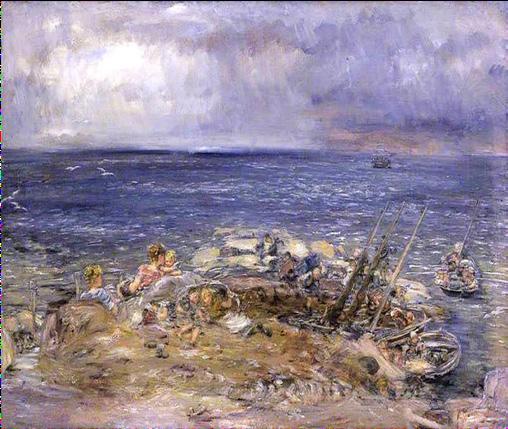
Φορέας



Hellenic Foundation for Research and Innovation and aims at exploring the prospect of a long-term settlement of recent migrants and refugees and subsequently the procedure of social integration that has to be followed in addition to the interrelated factors, such as the existing interface between indigenous and foreigners, potential problems detected by the presence of foreign population, perceived threats, differentiations in the attitudes of the Greek population towards respective ethnic groups, cultural distance, differentiations between first and second reception areas as well as divergences in the under study issues between distinct socio-economic and demographic clusters of the Greek population and the attitude of the incoming populations regarding
Φορείς



















Based on the above framework and after a thorough examination and validation of theoretical approaches concerning the migration/refugee issue and the detection of good practices focusing mostly on European Union countries, the succeeding research part aimed at the following: Firstly, the exploration of the attitude of the Greek society towards the long-term settlement of recent foreign population entering Greece through primary quantitative survey. Secondly, the detection of the actual social, economic and demographic consequences of the mass migration and refugee inflows either referring to the recent arrivals or to the migration wave of the 1990’s and the 1922 refugees with the use of multitudinous secondary data and research results. Finally, the role of state and regional policy agencies is studied through qualitative survey (interviews and focus groups).
Up until today the aforementioned theoretical and research approach of the project has been accomplished, whereas their comparative examination is attempted in addition to the application of a coherent policy exercise framework in order to effectively cope with the issue, which is the final research aim. The project is expected to be finalized with the use of theoretical feedback as emerged by research findings corresponding to the reciprocal relationship between theory
due to be completed by 18/6/2022, that is its total duration is 30 months. The current research project is funded by the
AEGEAN.EDU | ISSUE 07 16
The P.I. of the Project Kostas Rontos
Η ερευνητική εργασία υποστηρίχτηκε από το Ελληνικό Ίδρυμα Έρευνας και Καινοτομίας στο πλαίσιο της Δράσης «1 Προκήρυξη ερευνητικών έργων ΕΛ.ΙΔ.Ε.Κ. για την ενίσχυση των μελών ΔΕΠκαι Ερευνητών/τριών και την προμήθεια ερευνητικού εξοπλισμού μεγάλης αξίας» (Αριθμός έργου HFRI-FM17-2897
Υποδοχής Συνεργαζόμενοι
προσφύγων και των μεταναστών στην
των δημογραφικών και κοινωνικο -οικονομικών συνεπειών και η σημασία τους για την αποδοχή
προοπτικής αυτής από την Ελληνικ ή κοινωνία” ΠΑΝΕΠΙΣΤΗΜΙΟ ΑΙΓΑΙΟΥ ΟΙΚΟΝΟΜΙΚΟ ΠΑΝΕΠΙΣΤΗΜΙΟ ΑΘΗΝΩΝ ΕΘΝΙΚΟ ΚΕΝΤΡΟ ΚΟΙΝΩΝΙΚΩΝΕΡΕΥΝΩΝ GERMANJORDANIAN UNIVERSITY Οι μετανάστες - William McTaggart, 1883-1889
Ελλάδα:
της
School of Social Sciences
Department of Cultural Technology and Communication
PSmart
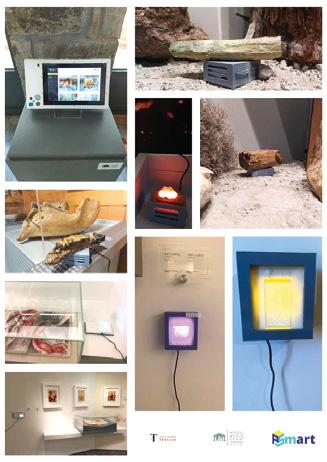
The PrivaSI research laboratory of the Dept. of Cultural Technology and Communication, Schools of Social Sciences, University of the Aegean is implementing a novel and interdisciplinary project namely "Design and development of secure smart devices for the preservation of tangible cultural heritage", which is funded under the NSRF 20142020, aimed to provide the equipment with 3D printing technology of a complete range of products for the design, development, and configuration of smart network devices, as well as the corresponding secure management software, in order to protect exhibits kept in cultural organizations from various environmental threats. Pilot installations of the devices took place at the Museum - Library Strati Eleftheriadis - Teriade and at the Natural History Museum of Lesvos Petrified Forest.
The PrivaSI research laboratory of the Dept. of Cultural Technology and Communication, Schools of Social Sciences, University of the Aegean co-organizes academic Summer Schools, such as the Intensive Program on Information and Communications Security - (IPICS). In 2018 IPICS was organized in Mytilene, where two-week courses were held by 21 renowned speakers in the field of Information and Communication Systems Security and were attended by over 25 participants.
Educational Chatbot for content and language integrated learning
The Semantic Web and IoT research group (Intelligent Systems Lab) of the Dept. of Cultural Technology and Communication, Schools of Social Sciences, University of the Aegean, developed an educational chatbot based on conversational AI and the educational method CLIL (content and language integrated learning). The evaluation of the chatbot conducted with cultural content in English and French, and in collaboration with the 1st General School of Excellence in Mytilene and the Language Learning centers of KENDERIS Edu and of Mrs. Ainizli Rena. The chatbot and the educational program is available from the webpage https:// eduasasara.wixsite.com/followasasara2020 and via FB/Messenger, Viber.
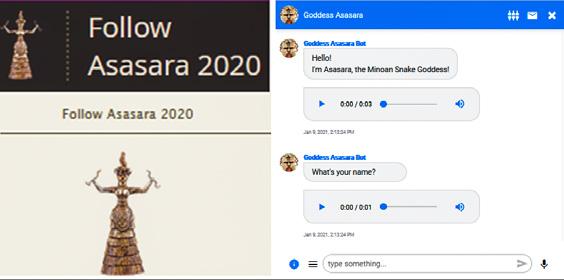
Open Linked Data of the Greek Children Art Museum
The Semantic Web and IoT research group (Intelligent Systems Lab) of the Dept. of Cultural Technology and Communication, Schools of Social Sciences, University of the Aegean, created linked open data (LOD) of the artworks in the museum of Greek Children Art. The work has been conducted with Linked Data (RDFa, Microdata) and cultural vocabularies of Europeana (EDM) and Google (Schema.org). More about the dataset you may find at https://www.childrensartmuseum.gr/LD-project/ and at Zenodo: https://zenodo. org/record/4425440.
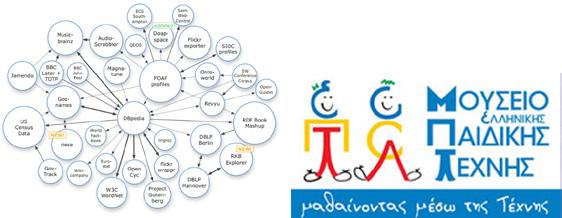
AEGEAN.EDU | ISSUE 07 17
School of Social Sciences
Department of Cultural Technology and Communication
A Retrospect of the «1st Metahuman Futures Forum – Lesvos 2022: Can we create a liveable Future
Αn international interdisciplinary conference of hybrid format (online and live) took place at the Department of Cultural Technology and Communication from September 26 to October 2, 2022 hosted by the Professor Evi Sampanikou. The forum and workshop Can we create a liveable Future? focused on the discussion around digital and physical artistic experimentation and aiming at reinventing the body &movement and exploring multiple sustainable ways of living and development to restore the Planetary health in the Anthropocene era. The research spreads within the whole range of arts, technology, philosophy and social practices. The main proposal of the central organizer Jaime del Val is to address the current global, ecological and social challenges with a unique, original and transversal approach that highlights the undervalued role of the moving body and the need to reinvent it. In this context, alongside the speeches, a workshop was organized in Eressos from 25 to 29 September 2022 that combined physical movement with theoretical and philosophical approaches to new technologies and took
https://metabody.eu/metahuman-lesvos-2022/ https://www.youtube.com/user/metabodyproject/videos
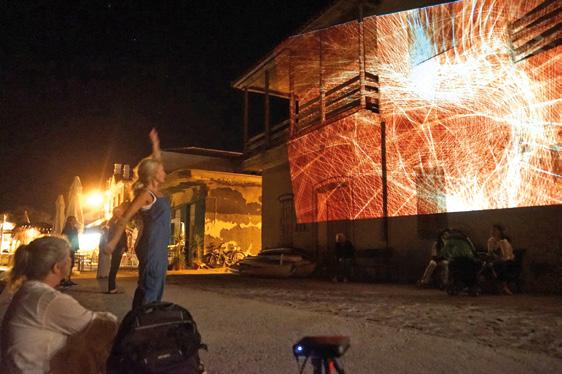
a stand for international and local socio-political issues: climate change, veganism, health and economic crises as well as offering support to the principles and objectives of the Eresos Initiative to protect Afentelli Beach against non-ecological and non-public forms of exploitation.
The forum concluded with a fruitful research expansion of the theories of Metahumanism and is a prelude to the 13th Beyond Humanism Conference that will be held at the beginning of July 2023, at the Department of Cultural Technology, organized by Professor Evi Sampanikou, in collaboration with the Institute for Philosophy and Social Theory of the University of Belgrade and the American University John Cabot in Rome.
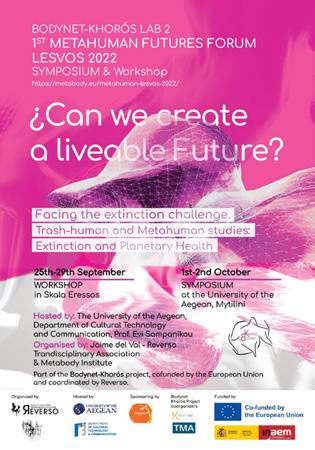
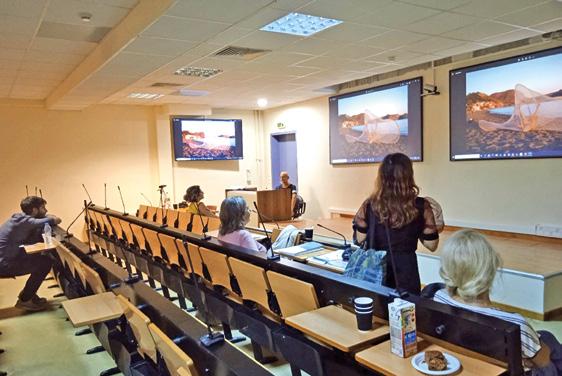
AEGEAN.EDU | ISSUE 07 18
School of Engineering
Department of Information and Communication Systems Engineering
The University of Aegean participates in the European Institute of Innovation and Technology with the PROMETHEUS project
The University of the Aegean under the umbrella of the PROMETHEUS project actively participated in the EIT Manufacturing Networking Event: Strengthening the Manufacturing Innovation Ecosystem, in Paris, France. The event was held at the business accelerator Station-F, the largest of its kind in the European Union. PROMETHEUS tools and entrepreneurial approach were highlighted through the two-day event, on which best practices were exchanged with other EIT HEI Initiative projects (INVENTHEI, RiEcoLab) and EIT Manufacturing partners.
The event provided a collaborative environment where participants brainstormed and co-created, following four activity areas based on interactions, training, platforms and tools in the Innovation & Entrepreneurship (I&E) Ecosystem.
These are the PROMETHEUS project digital tools:
• PROMETHEUS Knowledge Base (PKB): PKB is an online tool embedded in the Prometheus official site; it is a real-time news feed on entrepreneurship and innovation topics collected from the Internet.
• PROMETHEUS Intelligent Assistant (PIA): PIA is an online tool aimed at real-time evaluation of the efficiency of the start-ups or innovation driven business ideas such as the results of R&D projects by assessing the innovation, economic and social potential.
• PROMETHEUS Acceleration Platform: This platform will support the innovation and entrepreneurship competitions, with emphasis in gathering ecosystem needs and providing extensive mentoring.
PROMETHEUS project is an initiative of Universities, Research Centres and Enterprises from Greece, the Netherlands, Italy, Romania and North Macedonia, with a vision to develop and share their innovation and entrepreneurship support capabilities in the area of digital transformation related to circular economy, climate change and sustainable development.
The project is coordinated by the Information Systems Laboratory of the Department of Information and Communication Systems Engineering of the University of the Aegean.
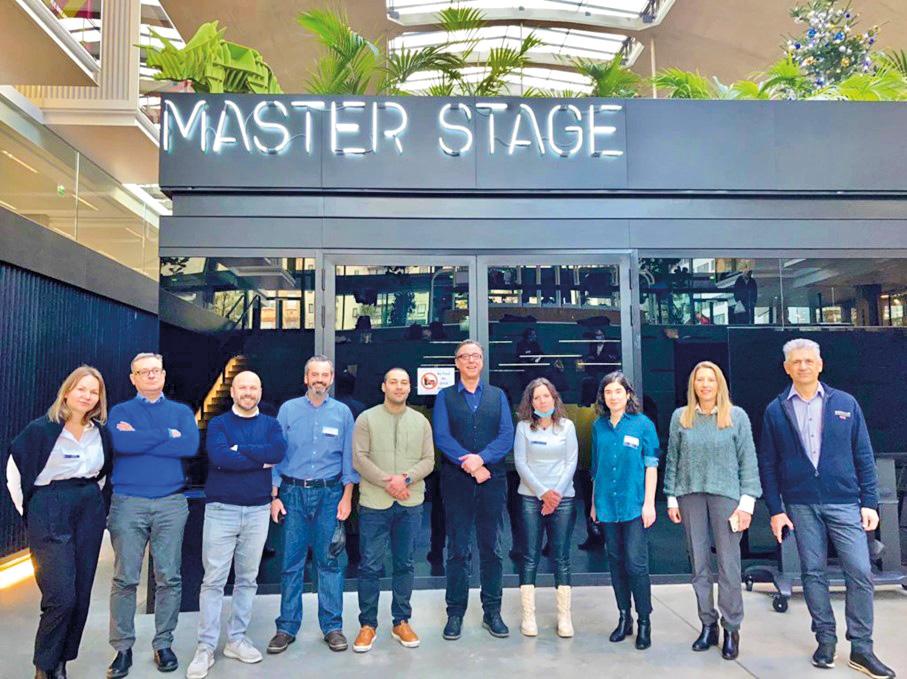
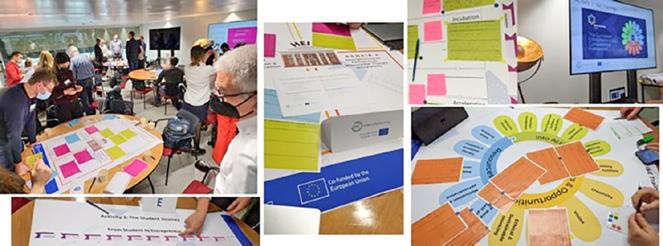
More information about the PROMETHEUS project press can be found at www.hei-prometheus.eu
AEGEAN.EDU | ISSUE 07 19
Members of the PROMETHEUS project at Station-F, Paris
School of Engineering
Department of Information and Communication Systems Engineering
Aegean Robotics Competition
The Aegean Robotics Competition (ARC) was organized for the first time by the Department of Information and Communication Systems Engineering (ICSD) of the University of the Aegean in the spring of 2017 in Karlovasi, Samos, by Professor Ms. Kavallieratou and her team.
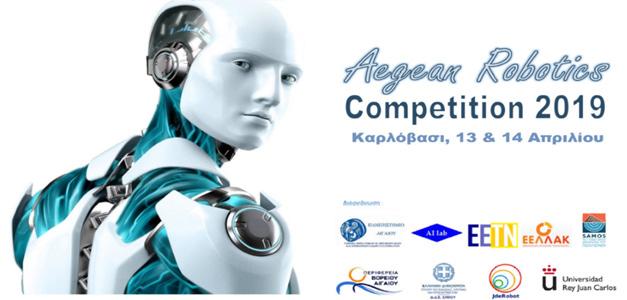
The increase of the participation in the competition was high, from year to year. From the 13 teams and the 55 participants of 2017, we had 46 teams and 150 participants in 2018 (increase of 350%) to reach the 63 teams and 259 participants in 2019 (increase of 137%). The permanent problem faced by the event was to find satisfactory facilities to cover the entries! And then came the Covid-19 pandemic. In 2020 the Competition was canceled.
The following year, in 2021, during the pandemic, the Competition changed the way it was conducted and became online using distance presentation methods. In its new beginning, the Competition had 21 teams and 88 participants, while for 2022, 31 teams and 138 participants have already declared their participation.

The tests in the first period of the Competition (20172019) were lineFollower, roboSumo and FreeStyle, a test where the contestants present their own robot in inspiration and construction which was evaluated by a committee of professors of the University of the Aegean and other universities. In the last two years, the change in the conduct of the Competition from a distance, has required the finding of two new tests: the climbing vertically on a wall and the Save the eggs where the robot carries ping-pong balls in the optimal time. The successful Free Style test was also maintained.
In the six-year history of the Competition, collaborations were made with universities abroad such as the Universidad "Rey Juan Carlos" of Spain, as well as with organizations such as the Organization of Open Technologies (EELLAK), the Hellenic Society of Artificial Intelligence (EETN) and its JDE Robot Spain.
The success of the event reflects the growing interest in robotics and STEM technologies, with the University of the Aegean present in this field as well.

AEGEAN.EDU | ISSUE 07 20
School of Engineering
Department of Information and Communication Systems Engineering
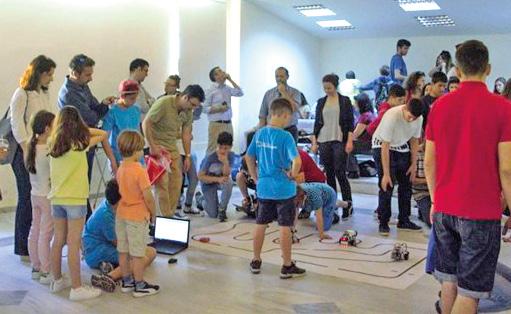
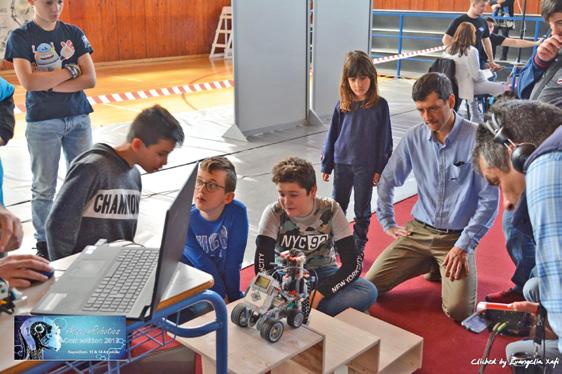

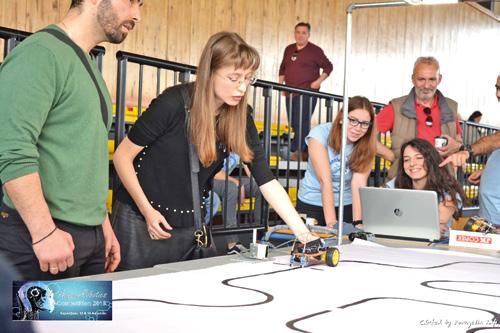

AEGEAN.EDU | ISSUE 07 21
School of Engineering
Department of Information and Communication Systems Engineering
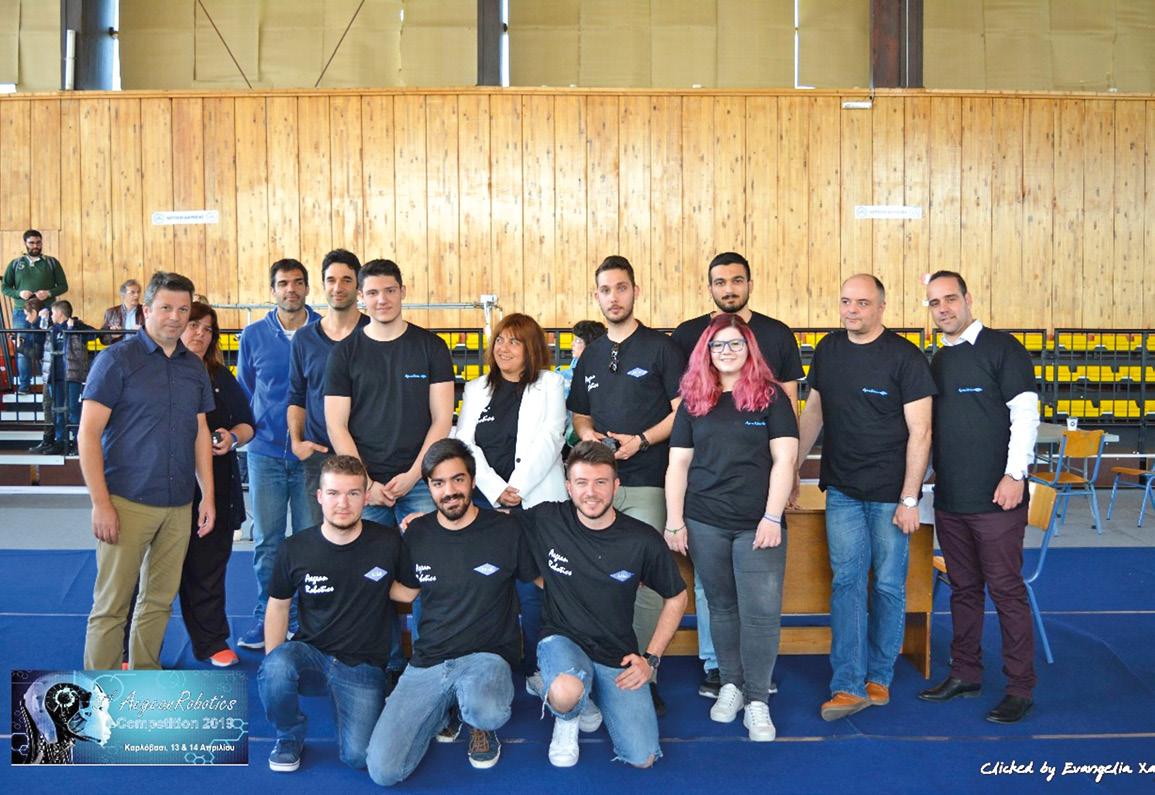
AEGEAN.EDU | ISSUE 07 22
School of Engineering
Department of Information and Communication Systems Engineering
El Greco‘s platform
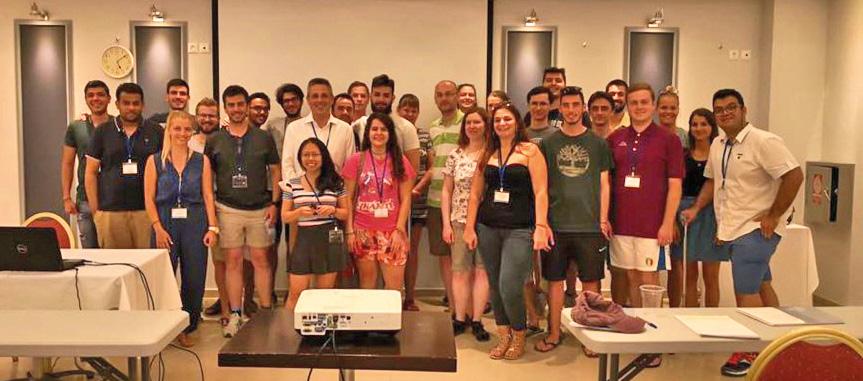
El Greco's platform is a distance learning platform for the Python programming language. Potential students using this site will be able to remotely control El Greco [1], a social humanoid robot that was developed to be cheap and easy to build as well as suitable for use in education. El Greco can perform a variety of tasks, such as combining movements, interacting socially in multiple languages, and providing information over the Internet. These features of the robot can be programmed by directly entering Python code or by using Google's Blockly library, which adds a processor to an application that represents interlocking block encoding concepts. The platform is hosted on a website which has registration and user profile creation services as well as the ability to create a reservation for the use of the robot. During the booking the user can see the robot performing the tasks he / she schedules through 8 available functions (Fig. 1-2). In addition to using the El Greco platform, the user is given the opportunity to play an 8-level game in which they are asked to create programs that require El Greco to perform a series of specific tasks.
The inspiration for creating the platform came from the fact that programming a robot seems to be a much more efficient and creative way to study a programming language [2]. This educational site was developed to be used mainly by students and offers anyone the opportunity to learn python while controlling a real robot at no cost.
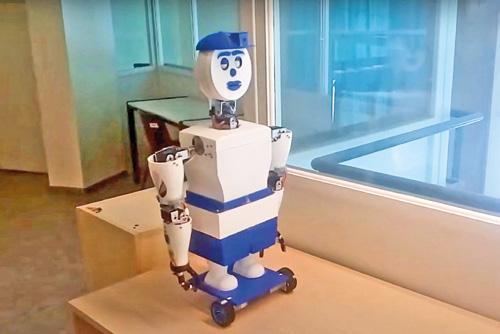
Research is currently being conducted on high school students in order to improve the experience of using and documenting the effect of this learning method on both the learning of a programming language and the involvement of potential students with robotics in general. For the purposes of the research, the log files that are automatically collected from the website and contain information about the interaction of users with the platform will be used. The processing of this information will be done by "Educational Process Mining" methods [3].
Interested users can send a request to kavallieratou@aegean.gr
[1] A. Mouratidis et al., “El Greco II: affordable social humanoid for educational use,” 2018.
[2] C. Breazeal, P. L. Harris, D. Desteno, J. M. Kory Westlund, L. Dickens, and S. Jeong, “Young Children Treat Robots as Informants,” Top. Cogn. Sci., vol. 8, no. 2, pp. 481–491, Apr. 2016, doi: 10.1111/TOPS.12192.
[3] A. Bogarίn, R. Cerezo, and C. Romero, “A survey on educational process mining,” Wiley Interdiscip. Rev. Data Min. Knowl. Discov., vol. 8, no. 1, p. e1230, Jan. 2018, doi: 10.1002/WIDM.1230.
AEGEAN.EDU | ISSUE 07 23
School of Enviroment
Department of Food Science and Nutrition
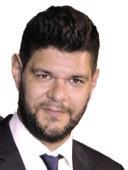
The Department of Food Science and Nutrition (D.F.S.N) of the University of the Aegean is reshaping its curriculum to offer a curriculum with modern scientific areas, which it will be unique in Greece and fully comparable to those of leading institutions abroad.
To this direction, Assistant Professor Kosmas Ellinas, one of the five new faculty members of the department, is working on physics and nanotechnology and their application in food science. His proposal to ELIDEK entitled "HEAT REGULATION" which deals with the development of ultra-thin and at the same time high-efficiency polymeric microfluidic devices for heat management in electronic devices and electronic processors using a combination of new technologies, was approved with a grade of 93.8 / 100, being to 1.9% of the highest scores from the proposals submitted in the thematic area SA.2 Engineering and Technology. The implementation of the above research program is expected to start within 2022 and it will be able to finance the elaboration of doctorates that are related to the proposal.
The above project concerns only a part of the activities that Dr. Ellinas intends to implement in the department. Other examples are: the development of devices for the collection of water from the atmosphere (a proposal was submitted to the European Union for Excellence Action ERC starting grant 2022), surfaces and "smart" food packaging with antibacterial properties as well as innovative diagnostics for food safety. For the implementation of the above, the establishment of a laboratory of materials technology and nanotechnology for applications in food science is planned. The above
activities are a field of research for many scientific groups worldwide and are in line with Europe's research and innovation strategy for 2020-2024 (https://ec.europa.eu/info/research-and-innovation/strategy/strategy-2020-2024_en)
It is therefore expected that D.F.S.N will have a significant presence in sectors of Industry 5.0 (e.g. nanotechnology), while the simultaneous introduction of relevant courses in the curriculum of the department will designate it as one of the most attractive ones for the new generation of scientists.
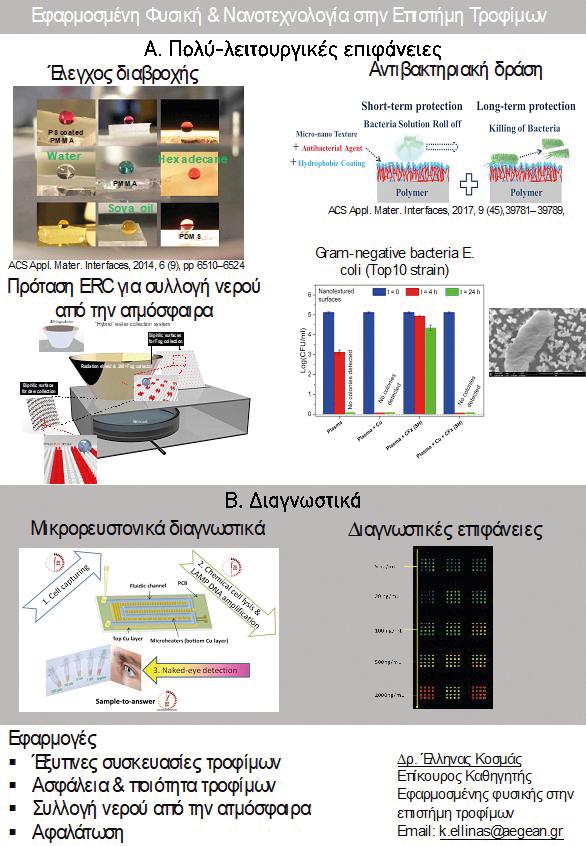
AEGEAN.EDU | ISSUE 07 24
The Aegean ERASMUS+ program
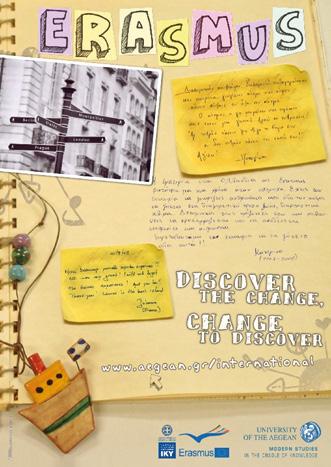
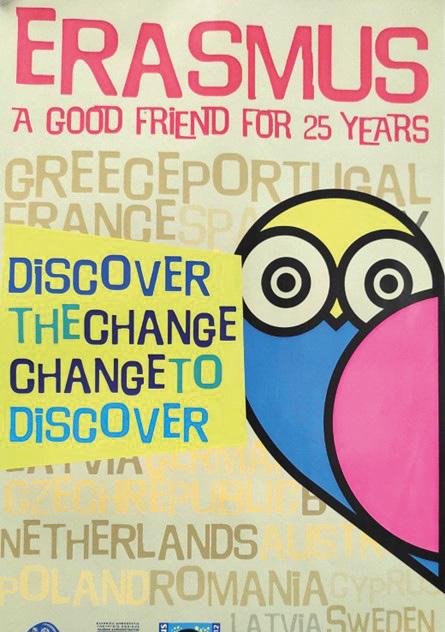
For more than 20 years, the student community and staff of the University of the Aegean have been increasingly actively participating in the Erasmus mobility program. Students move across Europe and the world, to study or work as part of internships through the Erasmus+ European and International Mobility Programs. Accordingly, teaching and administrative staff travel to teach and train. Everyone thus has the opportunity to get to know the academic culture and educational systems of different Universities, to gain cross-cultural experiences, to exchange knowledge, practices, perceptions, to talk to a large number of people, to visit different countries, to travel, to improve their language skills and broaden their horizons.
The Erasmus+ Office of the Aegean University, in a continuous course of development and organization of its work, tried from the first moment to respond more and more effectively to the needs of our community by systematizing the procedures that govern Erasmus mobility. The work of the Office is supported and disseminated within the community by two institutional Committees made up of the Heads of Departments: the Strategy Committee and the Erasmus + Management Committee.
In the last 2 years, the whole world has been marked by a pandemic of unprecedented extent and intensity, that of


Sars Covid-19, which has limited travel not only from one country or continent to another, but even from our home to our neighborhood. The blow to the Erasmus+ mobility exchange program was great, but the university community of the Aegean did not stop being interested and participating in the program, especially the male and female students, who even if they did not manage to make their move, participated with remarkable zeal in applications and planning, keeping interest in the program at a high level despite adverse conditions.
2021-22 is a turning point year, both because we are gradually moving into a post-pandemic era and students and staff are once again daring to dream, plan and implement their travels abroad, and because the new seven-year period of the Erasmus+ program (2021-27) begins with important EU initiatives in horizontal actions of the program as well as in increasing funding.
The new Erasmus+ wanting to emphasize the new era of digitization but also after 2 years of experience of extensive use of digital media in education for health reasons, emphasizes Digital Transformation, both in terms of program management but mainly regarding the addition of a new type of student mobility, blended mobility that combines a short-term physical mobility abroad for study or practice
AEGEAN.EDU | ISSUE 07 25
The UAegen Erasmus+ program
with a virtual component, enhancing distance education with digital means and aiming in particular at strengthening digital competences. Although the main objective of the program remains physical mobility, mixed mobility is offered primarily to remove restrictions on the movement of students who have fewer opportunities, thus contributing to the goal of the new Inclusion and Diversity program, so that people with fewer opportunities who experience any kind of exclusion (economic, social, health issues, racial discrimination, etc.), to have greater participation. (Active Participation in democratic life). The increase in funding for people with fewer opportunities who come from weaker economic environments is moving in the same direction, while in order to promote a sustainable environment and the fight against climate change, special financial support is provided for the use of environmentally friendly means of transport (“ Green Travel" - Green Travel).
The Erasmus+ Office constantly tries to respond to the challenges and adversities of the current situation and to the innovations of the new program, it constantly updates its new website https://www.erasmus.aegean.gr and is open to all members of the University Community for communication and dissemination of information.
University of the Aegean has been awarded with the Erasmus+ Charter 2021-27, by the European Commission (December 2020) with an evaluation of 100/100.
In the framework of the Erasmus+ mobility programs of the KA1 action, in the period 2018-2022, the University of the Aegean absorbed
An amount of €960,000 for mobility to EU Countries and partner Countries as follows:
251 students for Internship
126 students for Studies
167 members of the Staff for Teaching or Training
an amount of €365,000 for mobility from Partner Countries, in all continents outside Europe (International Mobility):
34 students for Studies or Internship
129 members of the Staff for Teaching or Training
In the framework of the Erasmus+ mobility programs of action KA1, over a period of 1.5 years (2022 to June 2023), the University of the Aegean absorbed
An amount of €572,800 for mobility to EU Countries and Countries associated with the program (European Mobility):
107 students for Internship
70 students for Studies
122 members of the Staff for Teaching or Training
An amount of €190,000 for mobility from/to Partner Countries, in all continents outside Europe (International Mobility):
15 students for Studies or Practice
55 members of the Staff for Teaching or Training
In the Call 2022 for Mobility Programs, the University of the Aegean received a total of more than €1,000,000 funding for Student and Staff Mobility in Europe and to/ from Partner Countries
For the International Mobility program in specific, the University of the Aegean received the highest evaluation (96/100) and the highest funding for International Mobility of Students and staff from/to Partner Countries (outside the EU) among all Greek Universities
In the same Call 2022, the University of the Aegean also received the largest funding it had ever received for Student and Staff mobility to EU Countries and Partner Countries ("European Mobility").
The new Erasmus+ is here and invites all members of the University Community of the Aegean to explore it and take advantage of its potential, live unique academic experiences and get to know new working environments in cooperating Universities and Institutions in Europe and throughout the People!
AEGEAN.EDU | ISSUE 07 26
ERASMUS experiences

Γειά σας, my name is Ikram Lahmidi, I am 26 years old, I am a PhD student from Morocco, I was selected under the Erasmus program to be a student for three months in the Marine Sciences Department of the School of the Environment at the University of the Aegean. I would like to take this chance to share my experience during my stay in this charming island these two months. First of all, I found Greek people very nice, hospitable and always ready to offer help as much as they can (Ευχαριστώ πολύ). Then I had the opportunity to improve my graphs thanks to R program lessons that I am taking at university. I was also able to learn some Greek words thanks to the Greek lessons. This stay wasn’t only for studies, but also it was a chance to visit a lot of monuments in Lesvos Island, thanks to the two days dedicated to field trips that the university organized for Erasmus students; in these two days I visited the Natural History Museum of the Lesvos Petrified Forest, where I saw the fossilized remaining’s of plants and trees, and learned the geological processes that lead to the creation of the forest. I also saw a wide variety of quartz minerals (pink quartz, amethyst…) and rocks. Moreover, I had the chance to admire the architecture that remains at the Archeological Site of the Sanctuary at Messa. In Petra, i enjoyed the short walk around the volcanic neck and visited the Panagia church. I also had the chance to visit Molyvos’s traditional village and its castle. I can’t speak about Lesvos and not mention Mytilene, this beautiful city where I had the op portunity to see the celebra tion of Easter’s nights and taste its traditional dishes, it also give me the chance to meet my new friends from all over the world. This journey will always be in my memory and heart for the rest of my life, it made me learn new things, challenge myself and making it better. In this regard I would like to thank my Professor Ourania Tzoraki for giving me this opportunity. In the end, I would like to thank the members of the Erasmus office, my Professors at the university and my friends for everything (Ευχαριστώ πολύ).
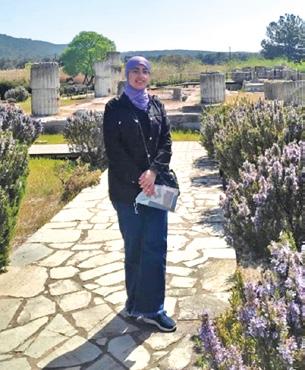
Ikram Lahmidi, Mobility for Studies, Sidi Mohamed ben Abdellah University, Morocco, March to June 2022 (Receiving Department: Marine Sciences, Mytilene)
From the experiences I gained, I would like to refer to the knowledge about the way of life of the Europeans and especially the Spanish people, since I lived there, the making of friends from different parts of Europe, the different trips to different cities in Spain and of course to the knowledge about the way of teaching and assessment of students in other European countries.
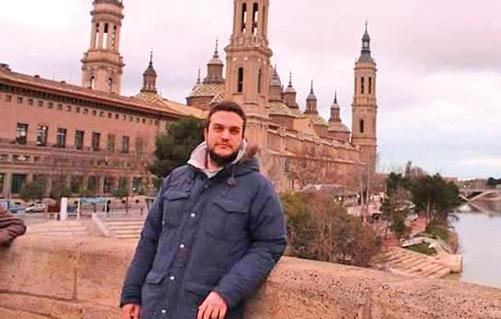
Anastasios Plestis, Mobility for studies, spring semester 2015-2016, Universidad San Jorge, Zaragoza, Spain
ERASMUS, Hi ! As the first students from outside the European Union specifically Moroccan students, we are so excited to be part of the most popular and intriguing life experience “ERASMUS”. First week was interesting because we had the chance to discover the island where we’ll be spending our mobility period, which is the beautiful island Lesvos and the city Mytilini that gives lovely vibes… Finally meeting new students from many different countries is the fun part, It will be the best chance to make new friends with whom we will explore new places and exchange our different cultures and experiences.
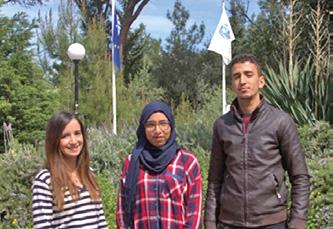
Abdel Mounim Bouadila, Nada Joumar, Soumaya Nabih, Students from Sidi Mohamed Ben Abdellah University, Faculty of Sciences and Techniques, Fez Morocco.
INTERNATIONAL CREDIT MOBILITY 2015
Completely new food, new everyday life, new educational systems and ways of organization. You soak up all these little experiences, combine them into one big one, and then all you have to do is say "I went on Erasmus!".
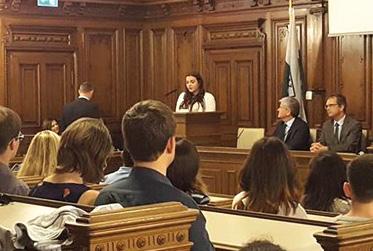
http://www.erasmus-journal.eu/mayors-reception-in-the-summer-semester/
Katerina Pitarokilli Mobility for Studies, Spring Semester 2015-2016, University College of Teacher Education, Styria, Graz Αustria
AEGEAN.EDU | ISSUE 07 27
ERASMUS experiences
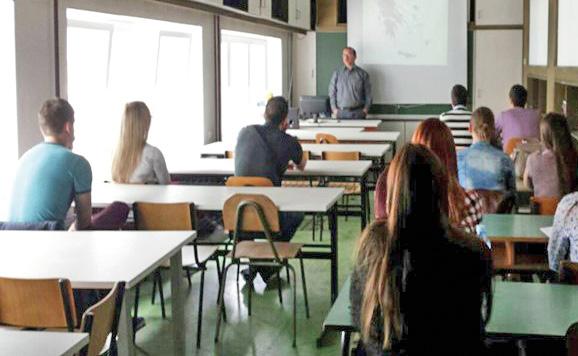
The experience was very interesting and fulfilling. I met new colleagues and students, I got to know (a bit of) another country in my region. I also had the opportunity to see the virtues and the challenges of a different system of tertiary education. The warm hospitality of my colleagues abroad laid the foundation for future collaboration between the two institutions.
Ass. Professor Andreas Andrikopoulos Mobility for Teaching Novi Sad, Serbia, May 2016.
It is of great help in allowing these exchanges to happen.
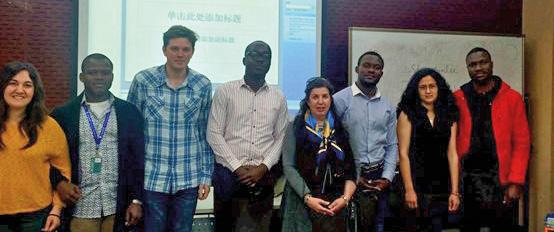
Professor Eleni Thanopoulou, Mobility for Teaching, Shanghai Maritime University, April 2016.
Mathilde Juin wrote:
Dear M. Tscheulin
Thank you very much !
I also wanted to thank you for this semester, for your classes, I learned a lot and improved my English. Lesbos is a beautiful island that I will miss, it was my first university exchange and it was an incredible experience.
Mathilde Juin, Mobility for Studies, Paris 1 Panthéon Sorbonne, France, February – June 2022 (Receiving Department: Geography)
Nizar Troudi wrote:
Dear Erasmus+ Team;
I am Nizar Troudi, a PhD candidate from University of Tunis El-Manar. I was nominated by the University of Tunis El-Manar to take part in an internship with ERASMUS+ at the Department of Marine Sciences, University of the Aegean, under the supervision of Pr. Rania Tzoraki. This e-mail is dedicated to express my gratitude and appreci-
ation towards the entire staff of the ERASMUS+ office who have assisted me throughout all the procedure of paperwork preparations. I would like to thank especially Mr. Georgios Koufos for his incredible assistance throughout the pre-mobility period, as he has been much patient and dealt in a very professional manner with all questions and needs I’ve had. I would also like to emphasize on the incredible hospitality of the University staff, and I appreciate the new acquaintances and relationships I’ve made throughout my stay. Apart from the obviously beneficial scientific aspect, I am glad to have made new friends and worked alongside colleagues from different countries around the world, as it helped me to get more familiar with once-stranger cultures. It’s also been a great opportunity for me to enhance my English language level throughout day-to-day communication. Overall, it has been an incredible experience, and I look forward to be part of the University of the Aegean Family once again.
Nizar Troudi, Mobility for Placement, University of Tunis el Manar, Tunisia December 2021 –February 2022 (Receiving Institution: Marine Sciences)
Evdokia Galipidu wrote: Dear Georgio, I would like to thank you for everything you have done for me. The organization at the Aegean University is great. I learned so much from the people in the laboratory, and professor Stasinakis is excellent, he helped me with everything, not only with the lab stuff. I also didn't expect so much help and care from the Erasmus team, you are incredible! The whole island is so special and I have met amazing people. I also significantly improved my Greek language which was very important to me.
As you can see I had a really good time in Mytilene, and that's why I'm sending you my new Learning Agreement, so I can come back in September. ��☺❤
Evdokia Galipidu, Mobility for Placement, University of Novi Sad, Serbia. May- July 2021 [ICM Program) and September – October 2021 (Receiving Department: Environment)
[the original text is in Spanish]
Lo fundamental de esta experiencia es que, frente a un espacio académico, en otra universidad, en otra lengua, requiriό un esfuerzo de traducciόn de lo que sabemos, para situarlo en esta nueva circunstancia. Este esfuerzo permitiό ampliar nuestro horizonte profesional. Comprender lo que requieren, para educar, los profesores griegos frente a lo que requieren los profesores mexicanos. Esta experiencia fue unica. Esto fue posible por la hospitalidad tanto de estudiantes como de profesores de esta universidad. La paciencia y el trato amable de Dra. Elena Theodoropoulou, fue la clave para lograr mi ingreso en este nuevo espacio con una lengua diferente. Esto ocurriό en mi primera estancia. La segunda
AEGEAN.EDU | ISSUE 07 28
ERASMUS experiences
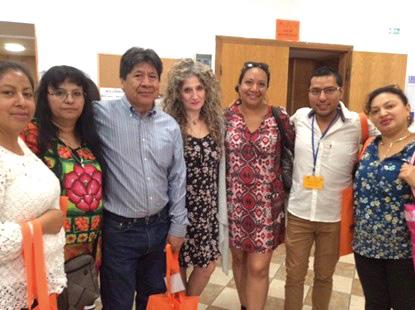
estancia, me hizo sentir integrado a esta universidad, porque participe como coordinador de intercambio entre nuestras universidades, presente un trabajo de investigaciόn y coordine una mesa de discusiόn. Todo en el marco de la Segunda Bienal 2018. Vivί otra vez, la tradiciόn y cultura de Rhodes. Visité la isla y su acropolis, vi directamente la cultura en la exposiciόn de las formas de vida del pueblo griego.
* The fundamental about my experience in the University of the Aegean in Rhodes was that, contrary to an academic space, in another university, in another language, where it is required an effort to translate what we know, to be situated it in this new circumstance, within the Laboratory οf Research on Practical Philosophy, the experience of this effort is like an openess and an embraciing. This particular relation that has been developed, allowed us to broaden our professional and philosophical horizon. This experience was unique. This was possible by the hospitality of both students and professors at this university. Professor Elena Theodoropoulou's patience and kind treatment was the key to my entrance into this new space with a different language. My second stay in the University of the Aegean, made me feel integrated this university, because in the frame of the International Biennale of Practical Philosophy, I lived again, the tradition and Rhodes's culture directly in the exhibition of the forms of life of the Greek people. Erasmus exchange is the way for a such profound experience.
Professor Pablo Flores del Rosario, Instituto Superior de Ciencias de la Educaciόn del Estado de México, 2016-17/2017-8
00C’est avec ces mots forts mais tout à fait authentiques que je peux définir, pour être juste et fidèle à cette expérience sans doute inoubliable, mon séjour à l’Université d’Egée et ma participation comme chercheur invité depuis l’étranger -sans jamais m’y sentir cependant un étranger- au Laboratoire de Recherche de Philosophie pratique et appliquée: comme une expérience communautaire faite de liens éducatives et d’amitiés. Je ne peux pas encore oublier, en effet, le geste hospitalier avec lequel je suis reçu lorsque je suis arrivé à Rhodes … Je conserve les souvenirs les plus beaux de ce séjour … Mais non seulement parce que j’y trouvé un lieu de formation et échange scientifique et philosophique inégalable. Surtout parce que j’y trouvé un sens de communauté très fort: une communauté éducative et des ami(e)s où les liens avec elle et avec eux seront des liens sans doute avec de nouveaux expériences et projets à venir et en commun. Dans ce sens, le Laboratoire de Recherche en Philosophie Pratique est une démarche philosophique et éducative unique et c’est le programme Erasmus qui m’a permis d’en avoir expérience.
* It is with these strong but completely authentic words that I can describe this undoubtedly unforgettable experience, my stay at the Uni-
versity of Aegean and my participation as a visiting researcher from abroad - without ever feeling like a stranger there, however - at the Practical Philosophy Research Laboratory: like a community experience made up of educational links and friendships. I cannot yet forget, in fact, the hospitable gesture with which I was received when I arrived in Rhodes. I keep the most beautiful memories of this stay … But not only because I found there a place of formation and unequaled scientific and philosophical exchange, but escpecially because I found there a very strong sense of community: an educational community and friends. In this sense, the Practical Philosophy Research Laboratory is a unique philosophical and educational approach and it is the Erasmus program that allowed me to experience it.
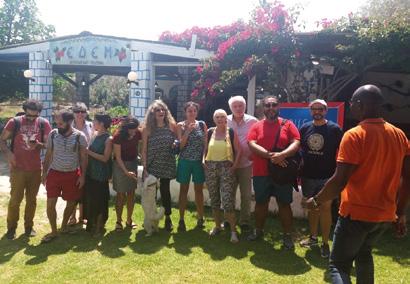
Juan José Martinez Olguin, Docteur en Philosophie à l’Université Paris VIII, Chercheur à l’Institut des Hautes Études Sociales (Université Nationale de San Martin), Professeur à ‘l’Université de Buenos Aires, 2017-8, 2021-2
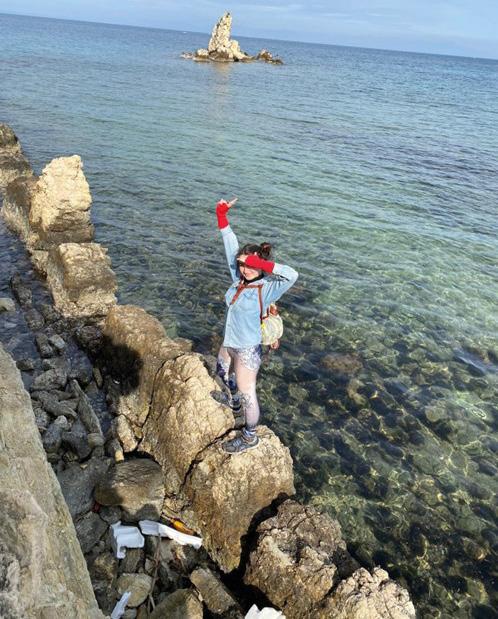
Attached are some pictures of my time in Mytilene.
Greetings Tanja
Τanja Thaller, student, University of Latvia, 2021-2
Dear Eleni, My experience as an Erasmus student was not easy due to a man I encountered unrelated to studies. Nonetheless, I had several unforgettable adventures and met wonderful people who up to this day count as some of my closest friends.

AEGEAN.EDU | ISSUE 07 29
The Aegean ERASMUS+ program
Continuing Education and Lifelong Learning Center (CE-LLC)

This year, the Continuing Education and Lifelong Learning Center (CE-LLC) of the University of the Aegean completed five years of successful operation, as an academic unit which ensures the coordination and interdisciplinary cooperation in the development of lifelong learning programs.
The establishment of CE-LLC (Government Gazette Issue 229717/Ζ1/05-01-2018, v. Β4) is part of the overall strategy of the University of the Aegean and allows the continuation of the institution’s activities in the context of Lifelong Learning, both in local and regional level in Greece, as well as at a national and international level, by utilizing new technologies during the educational process, and through the organization of summer schools.
From 2018, the CE-LLC, located in Rhodes Island (School of Humanities), has successfully implement a very large number of training programs mainly through e-Learning, leading to the issuance of training certificates to over 120,000 trainees. Meanwhile, CE-LLC has conducted plentiful Summer Schools on the Aegean Islands as well as in other regions of Greece, highlighting University of the Aegean as an attractive pole for young scientists and researchers from all over the world. The academic year 2022-23, CE-LLC, in the context of its commitment to integrated quality management and the continuous improvement and assurance of Security Information, has developed and implements a Quality Management System in accordance with the international standards ISO 9001:2015 Quality Management System , ISO 27001:2013 Information Technology-Security Techniques-Information Security Management Systems and ISO 27701:2019 Security Techniques-Extension to ISO/IEC 27001 AND ISO/IEC 27002 for Information Privacy Management.
At the same time, in April 2023, the new Operating Regulation of the Center was issued, incorporating all the necessary changes according to the new legislation framework about higher education in Greece (LAW 4957/2022).
These indicative data, represent the important work that has been accomplished by the staff of the Center, in collaboration with the members of the academic community and other units and services of the university, on the basis of which the Centre is placed among the top Continuing Education and Lifelong Learning Centers of the Greek Universities. This aim contributes a part of the general strategy of the university, according to which CE-LLC of the University of the Aegean, on the one hand should have a leading role in Non-Formal Education in Greece and on the other hand, to maintain and further develop the high degree of quality of its offered educational services, especially in the area of e-Learning, in which the University of the Aegean has been constantly innovating since 2000.
This goal isn’t easy and requires constant commitment and constant vigilance, but most of all it requires an organized mechanism with specialized human resources, capable of supporting administrative, financial, academic and technological operational requirements.
In this context, the Administration of the CCE, constantly, focus its efforts on the expansion of the technology infrastructure to support all the operational needs of the structure, the further strengthening of human resources, the further improvement of the quality of the educational work and the expansion of collaborations with other universities, stakeholders and scientific institutions, as it is a common belief, but also a goal of the university, that our CE-LLC, in a highly competitive and changing environment regarding Non-Formal Education in Greece, must continue to play a leading role among in national level, as a pillar of the university's development and an example of good practice, as well.
AEGEAN.EDU | ISSUE 07 30
